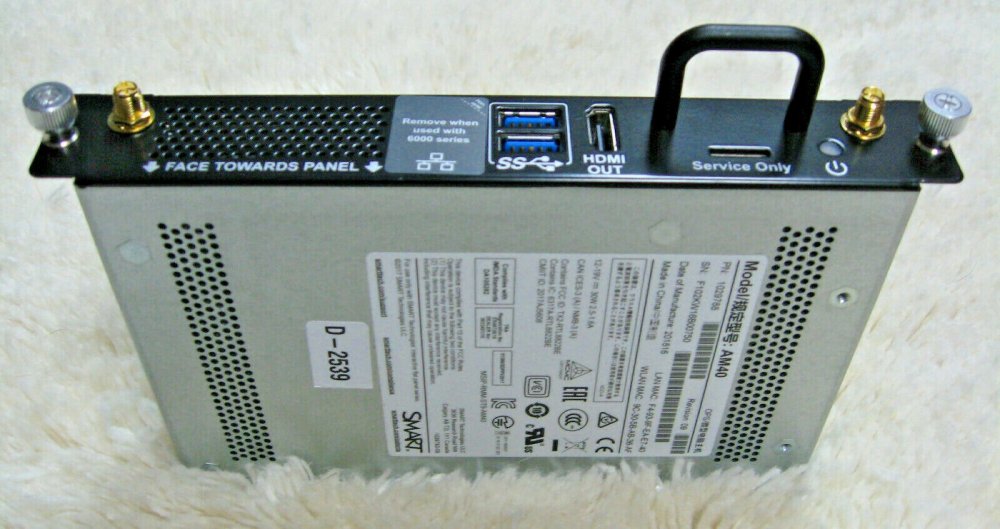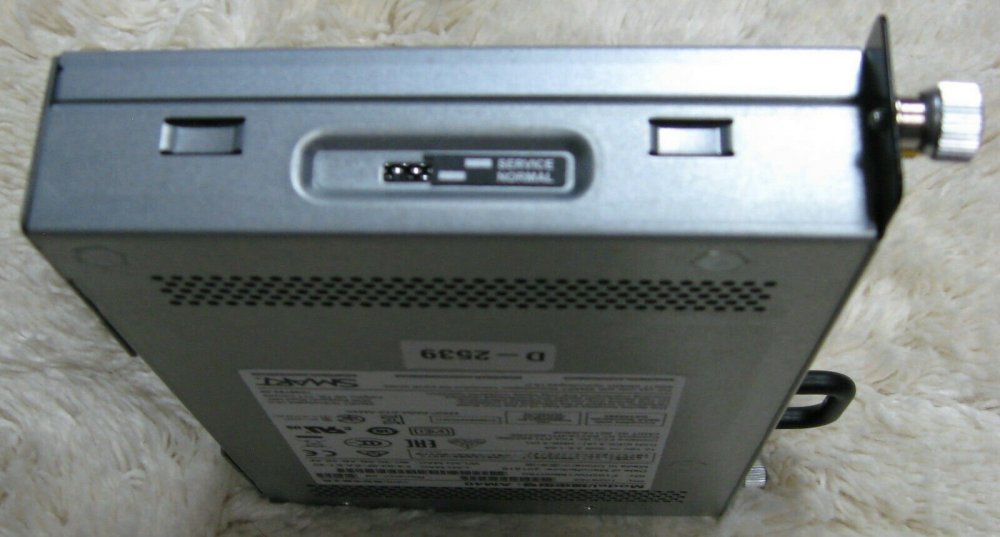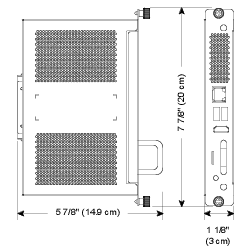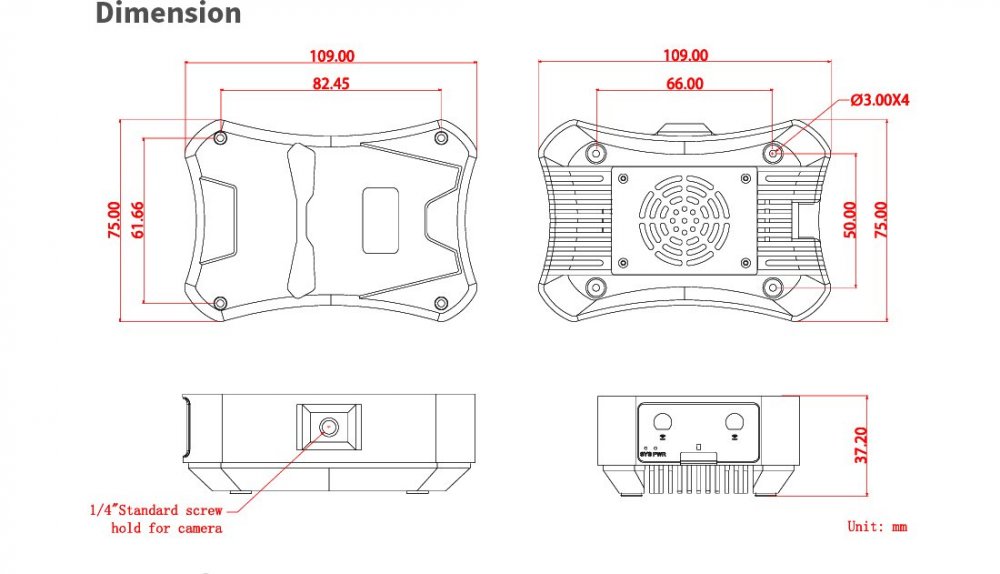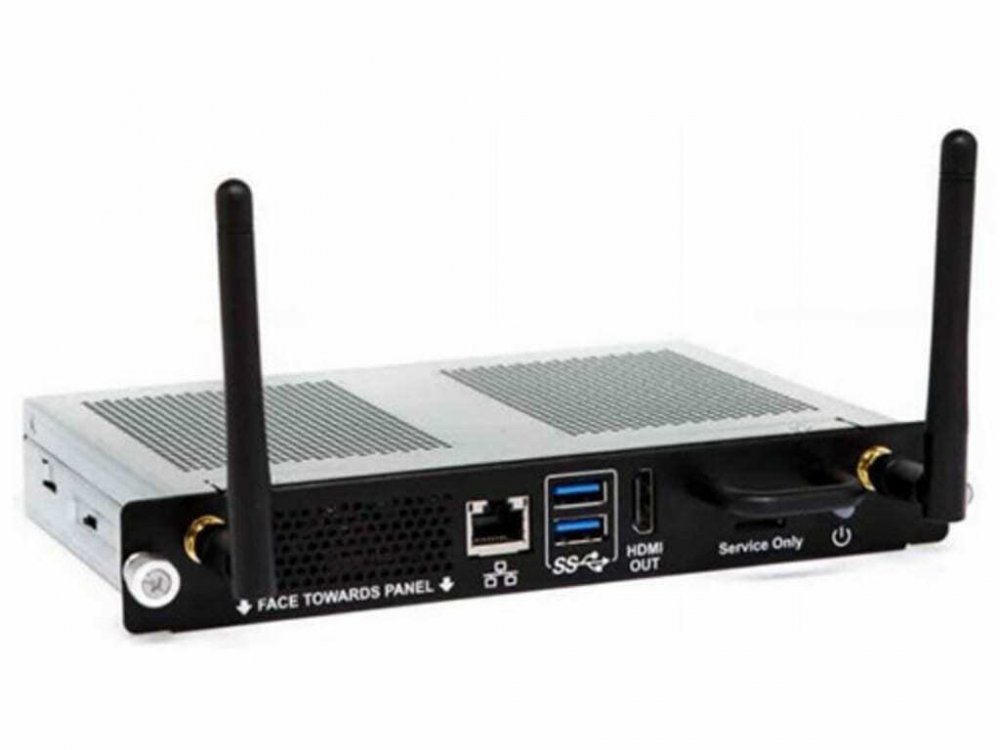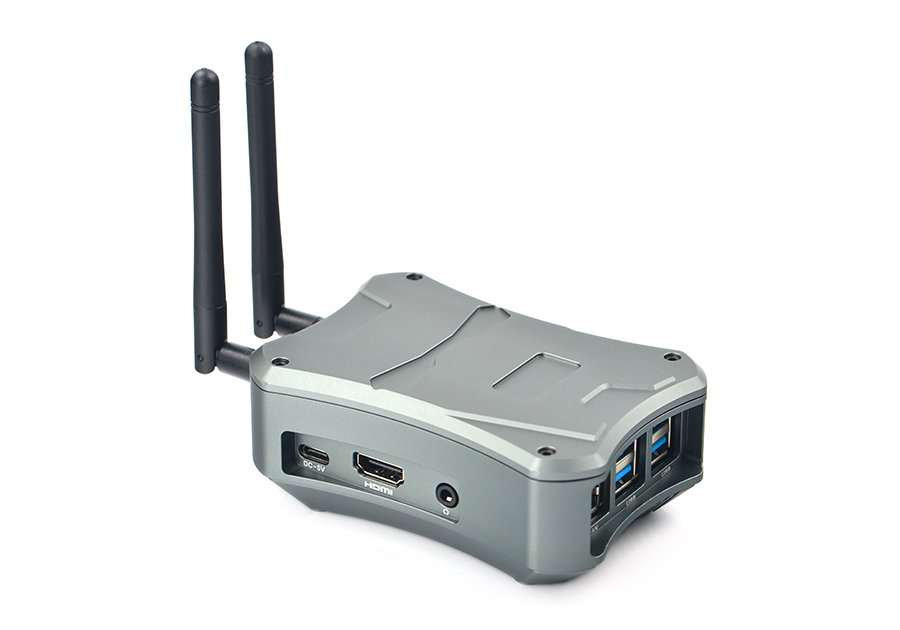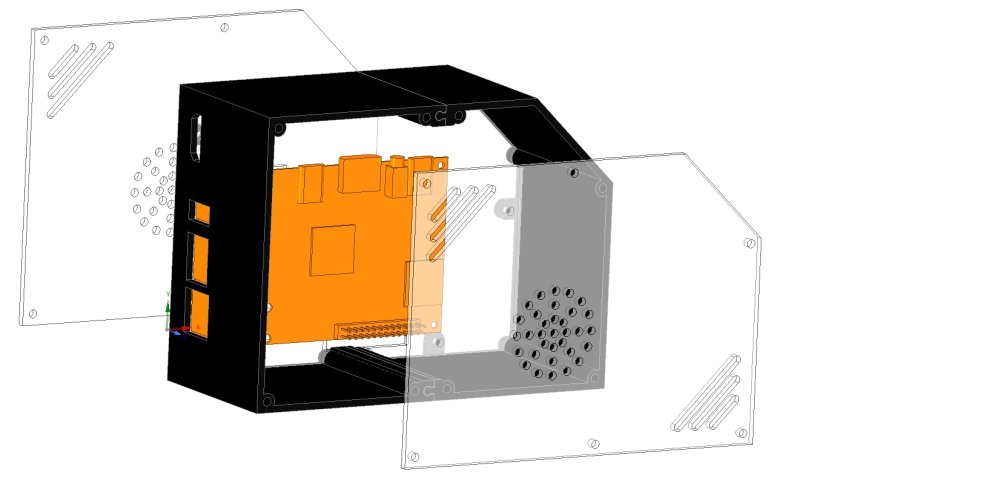Search the Community
Showing results for 'usb power'.
-
I never got a chance to try a self build image...however After updating I decided to give it a whirl...I have a 1TB USB->SSD adapter (yeah, way overkill!!!!), and a 64GB USB drive... The 1TB drive has a 1/2 dozen docker containers running on em (the OPiPC isn't a powerhouse by any stretch...but by golly it's running...and has been running like a BOSS!!!! Thanks Armbian devs!) Gave it a whirl one last time...even did it remotely! (was worried I would bork it and get locked out...but it came right up!) warhawk@orangepipc:~$ lsblk NAME MAJ:MIN RM SIZE RO TYPE MOUNTPOINTS sda 8:0 0 931.5G 0 disk └─sda1 8:1 0 931.5G 0 part /home/warhawk/hdd sdb 8:16 1 57.6G 0 disk └─sdb1 8:17 1 57.6G 0 part /var/log.hdd / mmcblk0 179:0 0 14.8G 0 disk └─mmcblk0p1 179:1 0 14.7G 0 part /boot /media/mmcboot zram0 254:0 0 499M 0 disk [SWAP] zram1 254:1 0 50M 0 disk /var/log zram2 254:2 0 0B 0 disk [Yeah, I have log2ram and zram-tools installed so it shows the mount point as /var/log.hdd and /] Worked like a boss...it did however blow out the /etc/fstab entry mounting the /dev/sda1 to /home/warhawk/hdd link...but was a VERY easy fix! warhawk@orangepipc:~$ cat /etc/fstab # <file system> <mount point> <type> <options> <dump> <pass> tmpfs /tmp tmpfs defaults,nosuid 0 0 UUID=705b28eb-7ba5-481e-ac44-cb93d2cfd612 /media/mmcboot ext4 defaults,noatime,commit=600,errors=remount-ro,x-gvfs-hide 0 1 /media/mmcboot/boot /boot none bind 0 0 UUID=3c82ef17-f148-4cd5-afb5-efa861ad05ef / btrfs defaults,noatime,commit=600,compress=lzo,x-gvfs-hide 0 2 UUID=7e6a8eab-cf51-4649-9526-dd8adfeb63e4 /home/warhawk/hdd ext4 defaults,noatime,commit=600,x-gvfs-hine 0 0 I even found an older version of geekbench built for older ARM and ran it...nope..not a power house https://browser.geekbench.com/v5/cpu/compare/21830053?baseline=21830053 Even got an ARMv7 version of netdata working in a docker and even though it is a wee bit heavy on system resources, it's running it Odd thing is...the OPiPC has been more resilient than my daggum RPi4B 8GB...for some reason it either locks up or burns out the stupid POE hats I put on it...but the OPiPC keeps chugging! Kudo's to you and the dev team! OUTSTANDING job!!!!!!!! N_A - Geekbench.pdf
-
The glmark2 results above are obtained from running gnome, the system starts and works without problems, including HDMI (left main port), LAN (DHCP), USB are working. If it doesn't start for you, show the full UART log, without it, it's empty chatter. follow the instructions for installing the mesa package with panthor exactly. If you don't like it, don't use it It's a lie, everything works fine for me and a number of other users. Follow the instructions and descriptions from this topic exactly (high-quality media SD cards or USB flash drives, power supplies without PD shit, the correct uboot in SPI, the order of launching and installing packages, etc.). If you want to get such options, transfer 1000 euros to the Armbian account or contact the developers of Collabora and pay them for this work (at the same time ask the employees of Colabora how much effort, time and money they spend on developing HDMI and GPU support for rk3588).
-
Greetings - I took the contents of the Armbian_23.8.1_Jetson-nano_bookworm_current_6.1.50 image and put it on my NFS server in an attempt to network boot my Jetson Nano device. After making some adjustments to the pxelinux.cfg so that it points to the correct files on my tftp server, the device fails to boot with the following u-boot output: Tegra210 (P3450-0000) # pxe boot 1: Armbian Retrieving file: /boot/jetson-nano-1/uInitrd Using eth_rtl8169 device TFTP from server 192.168.123.4; our IP address is 192.168.123.38 Filename '/boot/jetson-nano-1/uInitrd'. Load address: 0x83200000 Loading: ################################################################# ################################################################# ################################################################# ################################################################# ################################################################# ################################################################# ################################################################# ################################################################# ################################################################# ################################################################# ################################################################# ################################################################# ################################################################# ################################################################# ################################################################# ################################################################# ################################################################# ################################################################# ################################################################# ################################################################# ################################################################# ################################################################# ################################################################# ################################################################# ################################################################# ################################################################# ################################################################# ################################################################# ################################################################# ################################################################# ################################################################# ################################################################# ################################################################# ################################################################# ######################### 840.8 KiB/s done Bytes transferred = 32807968 (1f49c20 hex) Retrieving file: /boot/jetson-nano-1/Image Using eth_rtl8169 device TFTP from server 192.168.123.4; our IP address is 192.168.123.38 Filename '/boot/jetson-nano-1/Image'. Load address: 0x84000000 Loading: ################################################################# ################################################################# ################################################################# ################################################################# ################################################################# ################################################################# ################################################################# ################################################################# ################################################################# ################################################################# ################################################################# ################################################################# ################################################################# ################################################################# ################################################################# ################################################################# ################################################################# ################################################################# ################################################################# ################################################################# ################################################################# ################################################################# ################################################################# ################################################################# ################################################################# ################################################################# ################################################################# ################################################################# ############################################## 847.7 KiB/s done Bytes transferred = 27390464 (1a1f200 hex) append: root=/dev/nfs nfsroot=192.168.123.4:/rz2pool0/jetson-nano-nfs-1,vers=4.1,proto=tcp ip=dhcp console=ttyS0,115200n8 console=tty0 rw rootwait no_console_suspend consoleblank=0 fsck.fix=yes fsck.repair=yes net.ifnames=0 splash plymouth.ignore-serial-consoles Retrieving file: /boot/jetson-nano-1/dtb/nvidia/tegra210-p3450-0000.dtb Using eth_rtl8169 device TFTP from server 192.168.123.4; our IP address is 192.168.123.38 Filename '/boot/jetson-nano-1/dtb/nvidia/tegra210-p3450-0000.dtb'. Load address: 0x83000000 Loading: ###### 847.7 KiB/s done Bytes transferred = 84279 (14937 hex) ## Loading init Ramdisk from Legacy Image at 83200000 ... Image Name: uInitrd Image Type: AArch64 Linux RAMDisk Image (gzip compressed) Data Size: 32807904 Bytes = 31.3 MiB Load Address: 00000000 Entry Point: 00000000 Verifying Checksum ... Bad Data CRC Ramdisk image is corrupt or invalid I have verified that the uInitrd file and the vmlinuz files sha256 checksums match the ones from the Armbian image: 62ce5b826c319c4032e1bd973ba3675580990f228c7589be7e0991edc2079cab Image 1d8923fdaff529c62d6794b186b4b92d66ca6f2cacf8d0616da975e0d432ac68 initrd.img-6.1.50-current-media bdf62ae60589860cff80fc95b46998ad79d207649b92617c2b211d7f5793d585 System.map-6.1.50-current-media f22abfce4344c22bdb59087e8fa778c668c06839d010665933cd5499aa2ed104 uInitrd f22abfce4344c22bdb59087e8fa778c668c06839d010665933cd5499aa2ed104 uInitrd-6.1.50-current-media 62ce5b826c319c4032e1bd973ba3675580990f228c7589be7e0991edc2079cab vmlinuz-6.1.50-current-media It does take quite a bit of time for the Bad Data CRC error to appear, and the Data Size does not match the Bytes transferred listed earlier in the messages but that looks like it may be normal from my investigation thus far. I also noted that when trying to boot via SD card the GRUB2 bootloader is used and not the pxelinux loader, but I am unsure how to make an EFI bootloader work over the network. I also tried booting off a USB device, which works but a USB reset issue and/or switch from usb-storage to uas causes the system to become unusable because the boot device moves when systemd is not expecting it. I do have a good quality barrel jack 12V 4A power supply connected and no other devices in my network boot environment (when testing with the USB booting, there was only a USB SATA adapter attached). If anyone has any ideas, I would love to hear them.
-
Hello, it's been months since I've said to myself "I've got to get a cheap TV box, since SBCs are now so expensive and my Raspberry Pi 3 is showing its I/O and memory limits", and I think I'm now finally forced to, because 2 weeks ago my Pi started to show some strange (load/power) issues, and even started to emit a funny burned smell (!!!), slowly with hours of continuous (even if light) uptime. It still works, but I fear that some component is dying, maybe having kept an USB HDD connected for months has fried something: the smell strangely is always coming even after changing PSU and disconnecting the HDD (apart from that, there are now no other connected peripherals except for the microSD), and it appears to come from the micro-USB port section of the board. Point is, I don't trust this thing to keep working 24/7 after this incident, I have to get a new small homeserver. Indeed, I mostly used the Pi as a server these years, and after reading "Status of Armbian on TV Boxes" I think I can at least give a shot at trying to buy a TV box as a Pi substitute for this kind of task. Since today and tomorrow the Amazon Prime Day takes place, and I'm finding some more-decent-than-usual deals (yes, I did check with Keepa, some boxes are really on discount today), I thought I might as well buy now and stop postponing. So, my requirements are about the following, and they seem easy enough to get on today's TV boxes with Android, but I don't know what happens if I was to desire Armbian: 4 GB RAM or more (unlike the Pi's 1 GB) USB 3.0 ports (unlike the Pi's 2.0), to add big additional storage with minimal bottleneck (but maybe we don't rely on an USB-Y cable anymore if connected to a separate PSU...) WiFi, preferably 5 GHz, because I don't have a good place to put the box near my router, and can't have Ethernet cables going from one corner of the room to the opposite... Now, I probably don't really need bare-metal pure Linux, since the majority of the software I have to run can do so in a proot container in Android (in the past I did use an half-broken Android smartphone as a server actually), but I would have to sacrifice Docker (which sometimes is really useful) and also Pi-Hole (since to work it has to bind on a privileged port, and I wouldn't bet on being able to root these Android boxes), so I am at least making an attempt at buying something that can run Armbian. From what I'm gathering from the forum, the best choices are usually Rockchip boxes (most supported), next come those with some Amlogic SoCs (driven by a small community), and lastly there are some Allwinners. However, it's a bit chaotic trying to infer what's the best choice from browsing semi-random threads, and that's why I'm asking any potential TV box expert (now that's hyperspecialization!) what could be the best choice among what I found for an acceptable price (some are on Prime Day discount, some aren't but still have a good price): X88 Pro 10, X88 Pro 12: RK3318 chip, I understood that it's good support-wise (https://forum.armbian.com/topic/26978-csc-armbian-for-rk3318rk3328-tv-box-boards/#comment-122715), WiFi works too if I'm reading correctly, but hardware-wise it's kind of crap, wastes energy, and can fail. Oh well, I'll be honest: I know I should be worried, but I don't know how much worried! X88 Pro 13: RK3528, is it a very new SoC? I can't find anything on the forum about it, and so I fear there is no support. Magcubic thingy, Magcubic 8K Ultra HD, Tanix thingy (Allwinner H618); T95H, Q Plus (Allwinner H616): It appears these are not well supported, there are some experimental builds around but many things are broken. Would be happy to discover that I'm wrong on this and support is actually good for my standards, though. TUREWELL T95 Max+: Amlogic S905X3, here I kinda don't understand at all if there's enough good community support or not, but there are many threads about issues and solutions. To be clear: I can tinker if something doesn't work out-of-the-box with Armbian, I have a bit of experience with embedded devices like routers or Android smartphones so I think I could solve minor issues if they arise, but I'm really looking for a quick replacement for my Raspi and don't want to spend more than a few days after getting the box to make Armbian work. That's why I'm thinking so hard on getting a device with good compatibility. Anyways, thank you to anyone who comes here to help, I would appreciate it. If no help comes, I think I will bet on a box with the RK3318 and hope for the best.
-
Hi there, I've been trying to enable g_ether and USB OTG on my Orange PI 5+. I've tried things like editing /boot/orangepiEnv.txt and adding module-load dwc2,g_ether. However, I don't get any usb0 interface pop up which indicates to me that the USB/OTG mode is not set to peripheral on the settings. I'm not sure how to go about it? Would anyone be able to advise? I want to use the power port for also Ethernet.
-

Efforts to develop firmware for H96 MAX V56 RK3566 4G/32G
beiqidai replied to Hqnicolas's topic in Rockchip CPU Boxes
I use rk's sdk(http://en.t-firefly.com/doc/download/93.html#other_378) to directly compile all attachments ./build.sh Then I will overwrite the dtb in the compiled boot.img with your dtb(https://drive.google.com/file/d/1KPYJhKg6u4Q57ee4jhUlviu7zA0F_j2Y/view?usp=sharing). losetup -P /dev/loop1 boot.img mount /dev/loop1 /mnt cp ./rk3566-firefly-roc-pc.dtb /mnt/rk3566-firefly-roc-pc.dtb umount /mnt Then package it into rk firmware sudo ./build.sh updateimg But when I write to the development board, the system cannot be started normally. ttl: LP4/4x derate en, other dram:1x trefi ddrconfig:7 LPDDR4X, 324MHz BW=32 Col=10 Bk=8 CS0 Row=16 CS1 Row=16 CS=2 Die BW=16 Size=4096MB tdqss: cs0 dqs0: -48ps, dqs1: -168ps, dqs2: -120ps, dqs3: -217ps, tdqss: cs1 dqs0: -72ps, dqs1: -168ps, dqs2: -96ps, dqs3: -217ps, change to: 324MHz PHY drv:clk:36,ca:36,DQ:29,odt:0 vrefinner:24%, vrefout:41% dram drv:40,odt:0 clk skew:0x65 change to: 528MHz PHY drv:clk:36,ca:36,DQ:29,odt:0 vrefinner:24%, vrefout:41% dram drv:40,odt:0 clk skew:0x58 change to: 780MHz PHY drv:clk:36,ca:36,DQ:29,odt:0 vrefinner:24%, vrefout:41% dram drv:40,odt:0 clk skew:0x58 change to: 1056MHz(final freq) PHY drv:clk:36,ca:36,DQ:29,odt:60 vrefinner:16%, vrefout:22% dram drv:40,odt:80 vref_ca:00000071 clk skew:0x46 cs 0: the read training result: DQS0:0x3f, DQS1:0x3b, DQS2:0x41, DQS3:0x39, min :0x10 0xf 0x11 0xf 0x1 0x5 0x8 0x3 , 0x8 0x8 0x3 0x1 0x8 0x6 0x9 0x4 , 0x12 0x11 0xe 0xd 0x5 0x0 0x1 0x4 , 0xc 0x8 0x6 0x2 0xc 0xb 0x8 0xb , mid :0x2d 0x2e 0x2f 0x2c 0x20 0x22 0x27 0x22 ,0x26 0x27 0x22 0x1f 0x26 0x26 0x27 0x23 , 0x30 0x2f 0x2b 0x2a 0x23 0x1e 0x20 0x22 ,0x2a 0x27 0x25 0x21 0x2a 0x2a 0x28 0x2a , max :0x4b 0x4e 0x4e 0x4a 0x40 0x40 0x46 0x41 ,0x45 0x47 0x41 0x3d 0x44 0x46 0x46 0x43 , 0x4e 0x4e 0x48 0x47 0x42 0x3d 0x40 0x40 ,0x49 0x47 0x44 0x41 0x48 0x49 0x48 0x49 , range:0x3b 0x3f 0x3d 0x3b 0x3f 0x3b 0x3e 0x3e ,0x3d 0x3f 0x3e 0x3c 0x3c 0x40 0x3d 0x3f , 0x3c 0x3d 0x3a 0x3a 0x3d 0x3d 0x3f 0x3c ,0x3d 0x3f 0x3e 0x3f 0x3c 0x3e 0x40 0x3e , the write training result: DQS0:0x40, DQS1:0x30, DQS2:0x36, DQS3:0x29, min :0x61 0x64 0x64 0x64 0x55 0x57 0x5c 0x5c 0x5a ,0x50 0x51 0x4b 0x49 0x51 0x51 0x51 0x52 0x4e , 0x58 0x58 0x54 0x54 0x4c 0x4a 0x49 0x4f 0x4e ,0x4c 0x4a 0x47 0x45 0x4d 0x4d 0x49 0x50 0x49 , mid :0x7c 0x80 0x80 0x7e 0x70 0x72 0x76 0x75 0x74 ,0x6a 0x6a 0x64 0x63 0x6c 0x6a 0x6a 0x6b 0x67 , 0x74 0x73 0x6e 0x70 0x66 0x61 0x61 0x68 0x68 ,0x67 0x66 0x61 0x60 0x68 0x68 0x64 0x6a 0x61 , max :0x98 0x9c 0x9c 0x99 0x8c 0x8e 0x91 0x8f 0x8e ,0x85 0x84 0x7d 0x7e 0x87 0x83 0x84 0x84 0x80 , 0x90 0x8f 0x88 0x8c 0x81 0x79 0x7a 0x82 0x83 ,0x82 0x82 0x7c 0x7b 0x84 0x83 0x80 0x84 0x79 , range:0x37 0x38 0x38 0x35 0x37 0x37 0x35 0x33 0x34 ,0x35 0x33 0x32 0x35 0x36 0x32 0x33 0x32 0x32 , 0x38 0x37 0x34 0x38 0x35 0x2f 0x31 0x33 0x35 ,0x36 0x38 0x35 0x36 0x37 0x36 0x37 0x34 0x30 , cs 1: the read training result: DQS0:0x3e, DQS1:0x3b, DQS2:0x41, DQS3:0x39, min :0x10 0x10 0x11 0xf 0x1 0x5 0x8 0x3 , 0x9 0x8 0x2 0x2 0x8 0x7 0xb 0x5 , 0x12 0x12 0xe 0xd 0x5 0x0 0x2 0x3 , 0xd 0x8 0x6 0x2 0xc 0xb 0x8 0xa , mid :0x2c 0x2e 0x2f 0x2b 0x20 0x22 0x26 0x20 ,0x27 0x27 0x21 0x1f 0x26 0x26 0x29 0x24 , 0x30 0x30 0x2b 0x2a 0x23 0x1e 0x21 0x21 ,0x2b 0x27 0x24 0x21 0x2a 0x2a 0x27 0x28 , max :0x49 0x4c 0x4d 0x48 0x3f 0x40 0x44 0x3e ,0x45 0x47 0x41 0x3d 0x44 0x46 0x47 0x43 , 0x4e 0x4e 0x48 0x47 0x42 0x3d 0x40 0x40 ,0x49 0x46 0x43 0x40 0x48 0x49 0x47 0x47 , range:0x39 0x3c 0x3c 0x39 0x3e 0x3b 0x3c 0x3b ,0x3c 0x3f 0x3f 0x3b 0x3c 0x3f 0x3c 0x3e , 0x3c 0x3c 0x3a 0x3a 0x3d 0x3d 0x3e 0x3d ,0x3c 0x3e 0x3d 0x3e 0x3c 0x3e 0x3f 0x3d , the write training result: DQS0:0x40, DQS1:0x30, DQS2:0x36, DQS3:0x29, min :0x5e 0x62 0x62 0x61 0x55 0x56 0x58 0x58 0x59 ,0x51 0x51 0x4c 0x4b 0x52 0x52 0x53 0x53 0x4e , 0x5c 0x5c 0x57 0x58 0x51 0x4e 0x4d 0x54 0x52 ,0x4d 0x4a 0x48 0x45 0x4d 0x4d 0x4a 0x4d 0x48 , mid :0x7a 0x7e 0x7e 0x7c 0x70 0x71 0x74 0x73 0x73 ,0x6b 0x6b 0x66 0x65 0x6c 0x6b 0x6b 0x6b 0x68 , 0x78 0x78 0x72 0x74 0x6c 0x67 0x68 0x6e 0x6e ,0x68 0x66 0x61 0x60 0x69 0x69 0x65 0x68 0x61 , max :0x97 0x9a 0x9a 0x97 0x8b 0x8c 0x91 0x8f 0x8e ,0x86 0x85 0x80 0x80 0x87 0x84 0x84 0x83 0x82 , 0x94 0x94 0x8d 0x90 0x87 0x80 0x83 0x88 0x8a ,0x84 0x82 0x7b 0x7c 0x86 0x86 0x80 0x83 0x7b , range:0x39 0x38 0x38 0x36 0x36 0x36 0x39 0x37 0x35 ,0x35 0x34 0x34 0x35 0x35 0x32 0x31 0x30 0x34 , 0x38 0x38 0x36 0x38 0x36 0x32 0x36 0x34 0x38 ,0x37 0x38 0x33 0x37 0x39 0x39 0x36 0x36 0x33 , CA Training result: cs:0 min :0x55 0x49 0x4a 0x3e 0x4a 0x3e 0x4d ,0x51 0x40 0x48 0x38 0x48 0x36 0x4d , cs:0 mid :0x8e 0x8e 0x84 0x83 0x84 0x82 0x77 ,0x88 0x86 0x80 0x7e 0x80 0x7d 0x75 , cs:0 max :0xc8 0xd3 0xbe 0xc9 0xbe 0xc7 0xa2 ,0xc0 0xcc 0xb8 0xc5 0xb9 0xc4 0x9d , cs:0 range:0x73 0x8a 0x74 0x8b 0x74 0x89 0x55 ,0x6f 0x8c 0x70 0x8d 0x71 0x8e 0x50 , cs:1 min :0x4e 0x49 0x46 0x3f 0x46 0x3e 0x47 ,0x4e 0x45 0x46 0x3d 0x46 0x3e 0x47 , cs:1 mid :0x8a 0x8b 0x81 0x81 0x81 0x7f 0x73 ,0x89 0x86 0x81 0x7f 0x81 0x7f 0x73 , cs:1 max :0xc7 0xcd 0xbd 0xc4 0xbd 0xc1 0x9f ,0xc4 0xc7 0xbc 0xc2 0xbd 0xc0 0xa0 , cs:1 range:0x79 0x84 0x77 0x85 0x77 0x83 0x58 ,0x76 0x82 0x76 0x85 0x77 0x82 0x59 , out U-Boot SPL board init U-Boot SPL 2017.09(u-boot commit id: 8cf7a403b1cfcd50512c4a7b6669fbd0d57ba876)(sdk version: rk356x_linux_release_20230710_v1.3.2f.xml)-) unrecognized JEDEC id bytes: ff, ff, ff Trying to boot from MMC2 Card did not respond to voltage select! mmc_init: -95, time 9 spl: mmc init failed with error: -95 Trying to boot from MMC1 SPL: A/B-slot: _a, successful: 0, tries-remain: 7 Trying fit image at 0x4000 sector ## Verified-boot: 0 ## Checking atf-1 0x00040000 ... sha256(0d5225a4ab...) + OK ## Checking uboot 0x00a00000 ... sha256(4e042d4e83...) + OK ## Checking fdt 0x00b2fa48 ... sha256(607e77a63b...) + OK ## Checking atf-2 0xfdcc1000 ... sha256(3e94d16e6a...) + OK ## Checking atf-3 0x0006b000 ... sha256(fde0ef262b...) + OK ## Checking atf-4 0xfdcd0000 ... sha256(befba422b8...) + OK ## Checking atf-5 0xfdcce000 ... sha256(c9eb312bf2...) + OK ## Checking atf-6 0x00069000 ... sha256(6ede7a3b44...) + OK ## Checking optee 0x08400000 ... sha256(af414b9c9f...) + OK Jumping to U-Boot(0x00a00000) via ARM Trusted Firmware(0x00040000) Total: 159.546 ms INFO: Preloader serial: 2 NOTICE: BL31: v2.3():v2.3-607-gbf602aff1:cl NOTICE: BL31: Built : 10:16:03, Jun 5 2023 INFO: GICv3 without legacy support detected. INFO: ARM GICv3 driver initialized in EL3 INFO: pmu v1 is valid 220114 INFO: dfs DDR fsp_param[0].freq_mhz= 1056MHz INFO: dfs DDR fsp_param[1].freq_mhz= 324MHz INFO: dfs DDR fsp_param[2].freq_mhz= 528MHz INFO: dfs DDR fsp_param[3].freq_mhz= 780MHz INFO: Using opteed sec cpu_context! INFO: boot cpu mask: 0 INFO: BL31: Initializing runtime services INFO: BL31: Initializing BL32 I/TC: I/TC: OP-TEE version: 3.13.0-651-gd84087907 #hisping.lin (gcc version 10.2.1 20201103 (GNU Toolchain for the A-profile Architecture 10.4 I/TC: Primary CPU initializing I/TC: Primary CPU switching to normal world boot INFO: BL31: Preparing for EL3 exit to normal world INFO: Entry point address = 0xa00000 INFO: SPSR = 0x3c9 U-Boot 2017.09(u-boot commit id: 8cf7a403b1cfcd50512c4a7b6669fbd0d57ba876)(sdk version: rk356x_linux_release_20230710_v1.3.2f.xml)-g8cf) Model: Firefly RK3566 Board PreSerial: 2, raw, 0xfe660000 DRAM: 4 GiB Sysmem: init Relocation Offset: ed249000 Relocation fdt: eb9f8720 - eb9fecd8 CR: M/C/I Using default environment Hotkey: ctrl+` dwmmc@fe2b0000: 1, dwmmc@fe2c0000: 2, sdhci@fe310000: 0 Bootdev(atags): mmc 0 MMC0: HS200, 200Mhz PartType: EFI DM: v1 boot mode: recovery (misc) FIT: no signed, no conf required =================begin=================== 112204 bytes read in 7 ms (15.3 MiB/s) DTB(Distro): rk-kernel.dtb I2c0 speed: 100000Hz PMIC: RK8090 (on=0x40, off=0x00) vdd_logic init 900000 uV vdd_gpu init 900000 uV io-domain: OK Model: Firefly rk3566-roc-pc rockchip_set_serialno: could not find efuse/otp device No FDT memory address configured. Default at 0x08300000 CLK: (sync kernel. arm: enter 816000 KHz, init 816000 KHz, kernel 0N/A) apll 816000 KHz dpll 528000 KHz gpll 1200000 KHz cpll 1000000 KHz npll 24000 KHz vpll 24000 KHz hpll 24000 KHz ppll 200000 KHz armclk 816000 KHz aclk_bus 150000 KHz pclk_bus 50000 KHz aclk_top_high 300000 KHz aclk_top_low 200000 KHz hclk_top 150000 KHz pclk_top 50000 KHz aclk_perimid 300000 KHz hclk_perimid 150000 KHz pclk_pmu 100000 KHz Net: eth0: ethernet@fe010000 Hit key to stop autoboot('CTRL+C'): 0 ANDROID: reboot reason: "recovery" optee api revision: 2.0 TEEC: Waring: Could not find security partition Not AVB images, AVB skip No valid android hdr Android image load failed Android boot failed, error -1. ## Booting FIT Image at 0xe96b0f00 with size 0x02146800 Fdt Ramdisk skip relocation ## Loading kernel from FIT Image at e96b0f00 ... Using 'conf' configuration ## Verified-boot: 0 Trying 'kernel' kernel subimage Description: unavailable Type: Kernel Image Compression: uncompressed Data Start: 0xe96d1500 Data Size: 24940552 Bytes = 23.8 MiB Architecture: AArch64 OS: Linux Load Address: 0x00280000 Entry Point: 0x00280000 Hash algo: sha256 Hash value: 31cca7854008e66d8acf6071ca552cef81a7302e2487979662c87e4f05eaaa65 Verifying Hash Integrity ... sha256+ OK ## Loading ramdisk from FIT Image at e96b0f00 ... Using 'conf' configuration Trying 'ramdisk' ramdisk subimage Description: unavailable Type: RAMDisk Image Compression: uncompressed Data Start: 0xeae9a700 Data Size: 9818024 Bytes = 9.4 MiB Architecture: AArch64 OS: Linux Load Address: 0x0a200000 Entry Point: unavailable Hash algo: sha256 Hash value: 2f5de603deedb025c2cefcb6b6d3d708b30211729cbadc652632eb3e781a80dc Verifying Hash Integrity ... sha256+ OK Loading ramdisk from 0xeae9a700 to 0x0a200000 ## Loading fdt from FIT Image at e96b0f00 ... Using 'conf' configuration Trying 'fdt' fdt subimage Description: unavailable Type: Flat Device Tree Compression: uncompressed Data Start: 0xe96b1700 Data Size: 130218 Bytes = 127.2 KiB Architecture: AArch64 Load Address: 0x08300000 Hash algo: sha256 Hash value: 1a50a36a025a43f85741ff5f9f0912c89deb1eaa4bc2bb1981c1999fa81b4f41 Verifying Hash Integrity ... sha256+ OK Loading fdt from 0x08300000 to 0x08300000 Booting using the fdt blob at 0x08300000 Loading Kernel Image from 0xe96d1500 to 0x00280000 ... OK kernel loaded at 0x00280000, end = 0x01a49008 Using Device Tree in place at 0000000008300000, end 000000000831e64b can't found rockchip,drm-logo, use rockchip,fb-logo WARNING: could not set reg FDT_ERR_BADOFFSET. failed to reserve fb-loader-logo memory Adding bank: 0x00200000 - 0x08400000 (size: 0x08200000) Adding bank: 0x09400000 - 0xf0000000 (size: 0xe6c00000) Adding bank: 0x1f0000000 - 0x200000000 (size: 0x10000000) Total: 813.141 ms Starting kernel ... I/TC: Secondary CPU 1 initializing I/TC: Secondary CPU 1 switching to normal world boot I/TC: Secondary CPU 2 initializing I/TC: Secondary CPU 2 switching to normal world boot I/TC: Secondary CPU 3 initializing I/TC: Secondary CPU 3 switching to normal world boot [ 0.000000] Booting Linux on physical CPU 0x0000000000 [0x412fd050] [ 0.000000] Linux version 4.19.232 (root@firefly) (firefly: f7165816db073abb32bfe4f754a317d687c7bbcf) (sdk version: rk356x_linux_rel3 [ 0.000000] Machine model: Firefly rk3566-roc-pc [ 0.000000] cma: Reserved 16 MiB at 0x00000000ef000000 [ 0.000000] psci: probing for conduit method from DT. [ 0.000000] psci: PSCIv1.1 detected in firmware. [ 0.000000] psci: Using standard PSCI v0.2 function IDs [ 0.000000] psci: Trusted OS migration not required [ 0.000000] psci: SMC Calling Convention v1.2 [ 0.000000] percpu: Embedded 24 pages/cpu s60136 r8192 d29976 u98304 [ 0.000000] Detected VIPT I-cache on CPU0 [ 0.000000] CPU features: detected: Virtualization Host Extensions [ 0.000000] CPU features: detected: Speculative Store Bypassing Safe (SSBS) [ 0.000000] Built 1 zonelists, mobility grouping on. Total pages: 1027656 [ 0.000000] Kernel command line: storagemedia=emmc androidboot.storagemedia=emmc androidboot.mode=normal storagenode=/sdhci@fe31000e [ 0.000000] Dentry cache hash table entries: 524288 (order: 10, 4194304 bytes) [ 0.000000] Inode-cache hash table entries: 262144 (order: 9, 2097152 bytes) [ 0.000000] mem auto-init: stack:off, heap alloc:off, heap free:off [ 0.000000] software IO TLB: mapped [mem 0xeafff000-0xeefff000] (64MB) [ 0.000000] Memory: 3969132K/4175872K available (15422K kernel code, 1956K rwdata, 5340K rodata, 1600K init, 596K bss, 190356K reser) [ 0.000000] SLUB: HWalign=64, Order=0-3, MinObjects=0, CPUs=4, Nodes=1 [ 0.000000] ftrace: allocating 54754 entries in 214 pages [ 0.000000] rcu: Hierarchical RCU implementation. [ 0.000000] rcu: RCU event tracing is enabled. [ 0.000000] rcu: RCU restricting CPUs from NR_CPUS=8 to nr_cpu_ids=4. [ 0.000000] rcu: Adjusting geometry for rcu_fanout_leaf=16, nr_cpu_ids=4 [ 0.000000] NR_IRQS: 64, nr_irqs: 64, preallocated irqs: 0 [ 0.000000] GICv3: GIC: Using split EOI/Deactivate mode [ 0.000000] GICv3: Distributor has no Range Selector support [ 0.000000] GICv3: MBI range [296:319] [ 0.000000] GICv3: Using MBI frame 0x00000000fd410000 [ 0.000000] GICv3: no VLPI support, no direct LPI support [ 0.000000] ITS: No ITS available, not enabling LPIs [ 0.000000] GICv3: CPU0: found redistributor 0 region 0:0x00000000fd460000 [ 0.000000] random: random: get_random_bytes called from start_kernel+0x358/0x4e4 with crng_init=0 [ 0.000000] rockchip_clk_register_muxgrf: regmap not available [ 0.000000] rockchip_clk_register_branches: failed to register clock clk_32k_ioe: -524 [ 0.000000] arch_timer: cp15 timer(s) running at 24.00MHz (phys). [ 0.000000] clocksource: arch_sys_counter: mask: 0xffffffffffffff max_cycles: 0x588fe9dc0, max_idle_ns: 440795202592 ns [ 0.000006] sched_clock: 56 bits at 24MHz, resolution 41ns, wraps every 4398046511097ns [ 0.001295] Console: colour dummy device 80x25 [ 0.001976] console [tty0] enabled [ 0.002033] Calibrating delay loop (skipped), value calculated using timer frequency.. 48.00 BogoMIPS (lpj=80000) [ 0.002071] pid_max: default: 32768 minimum: 301 [ 0.002251] Security Framework initialized [ 0.002284] AppArmor: AppArmor disabled by boot time parameter [ 0.002385] Mount-cache hash table entries: 8192 (order: 4, 65536 bytes) [ 0.002430] Mountpoint-cache hash table entries: 8192 (order: 4, 65536 bytes) [ 0.004623] ASID allocator initialised with 32768 entries [ 0.004825] rcu: Hierarchical SRCU implementation. [ 0.009156] smp: Bringing up secondary CPUs ... [ 0.010792] Detected VIPT I-cache on CPU1 [ 0.010835] GICv3: CPU1: found redistributor 100 region 0:0x00000000fd480000 [ 0.010883] CPU1: Booted secondary processor 0x0000000100 [0x412fd050] [ 0.012531] Detected VIPT I-cache on CPU2 [ 0.012562] GICv3: CPU2: found redistributor 200 region 0:0x00000000fd4a0000 [ 0.012598] CPU2: Booted secondary processor 0x0000000200 [0x412fd050] [ 0.014249] Detected VIPT I-cache on CPU3 [ 0.014280] GICv3: CPU3: found redistributor 300 region 0:0x00000000fd4c0000 [ 0.014313] CPU3: Booted secondary processor 0x0000000300 [0x412fd050] [ 0.014455] smp: Brought up 1 node, 4 CPUs [ 0.014620] SMP: Total of 4 processors activated. [ 0.014641] CPU features: detected: GIC system register CPU interface [ 0.014661] CPU features: detected: Privileged Access Never [ 0.014680] CPU features: detected: LSE atomic instructions [ 0.014699] CPU features: detected: User Access Override [ 0.014717] CPU features: detected: 32-bit EL0 Support [ 0.014736] CPU features: detected: RAS Extension Support [ 0.014923] CPU: All CPU(s) started at EL2 [ 0.014973] alternatives: patching kernel code [ 0.022199] devtmpfs: initialized [ 0.047755] Registered cp15_barrier emulation handler [ 0.047803] Registered setend emulation handler [ 0.048256] clocksource: jiffies: mask: 0xffffffff max_cycles: 0xffffffff, max_idle_ns: 6370867519511994 ns [ 0.048308] futex hash table entries: 1024 (order: 4, 65536 bytes) [ 0.049247] pinctrl core: initialized pinctrl subsystem [ 0.050446] NET: Registered protocol family 16 [ 0.051207] audit: initializing netlink subsys (disabled) [ 0.051513] audit: type=2000 audit(0.046:1): state=initialized audit_enabled=0 res=1 [ 0.055130] cpuidle: using governor menu [ 0.055194] Registered FIQ tty driver [ 0.055685] hw-breakpoint: found 6 breakpoint and 4 watchpoint registers. [ 0.057092] DMA: preallocated 256 KiB pool for atomic allocations [ 0.091817] rockchip-gpio fdd60000.gpio: probed gpio0 (fdd60000.gpio) [ 0.092596] rockchip-gpio fe740000.gpio: probed gpio1 (fe740000.gpio) [ 0.093327] rockchip-gpio fe750000.gpio: probed gpio2 (fe750000.gpio) [ 0.094043] rockchip-gpio fe760000.gpio: probed gpio3 (fe760000.gpio) [ 0.094771] rockchip-gpio fe770000.gpio: probed gpio4 (fe770000.gpio) [ 0.094979] rockchip-pinctrl pinctrl: probed pinctrl [ 0.112016] HugeTLB registered 2.00 MiB page size, pre-allocated 0 pages [ 0.112298] cryptd: max_cpu_qlen set to 1000 [ 0.112982] fbcon: Taking over console [ 0.114105] reg-fixed-voltage vcc3v3-sys: Failed to register regulator: -517 [ 0.114266] vcc5v0_sys: supplied by vcc5v0_in [ 0.115075] vcc5v0_host: supplied by vcc5v0_sys [ 0.115761] vcc5v0_otg: supplied by vcc5v0_sys [ 0.117342] SCSI subsystem initialized [ 0.117688] usbcore: registered new interface driver usbfs [ 0.117778] usbcore: registered new interface driver hub [ 0.117863] usbcore: registered new device driver usb [ 0.118000] media: Linux media interface: v0.10 [ 0.118068] videodev: Linux video capture interface: v2.00 [ 0.118233] pps_core: LinuxPPS API ver. 1 registered [ 0.118257] pps_core: Software ver. 5.3.6 - Copyright 2005-2007 Rodolfo Giometti <giometti@linux.it> [ 0.118305] PTP clock support registered [ 0.118750] arm-scmi firmware:scmi: SCMI Protocol v2.0 'rockchip:' Firmware version 0x0 [ 0.120704] Advanced Linux Sound Architecture Driver Initialized. [ 0.121420] Bluetooth: Core ver 2.22 [ 0.121550] NET: Registered protocol family 31 [ 0.121574] Bluetooth: HCI device and connection manager initialized [ 0.121607] Bluetooth: HCI socket layer initialized [ 0.121632] Bluetooth: L2CAP socket layer initialized [ 0.121689] Bluetooth: SCO socket layer initialized [ 0.126365] clocksource: Switched to clocksource arch_sys_counter [ 0.223492] thermal thermal_zone0: power_allocator: sustainable_power will be estimated [ 0.223729] thermal thermal_zone1: power_allocator: sustainable_power will be estimated [ 0.224157] NET: Registered protocol family 2 [ 0.224462] IP idents hash table entries: 65536 (order: 7, 524288 bytes) [ 0.226875] tcp_listen_portaddr_hash hash table entries: 2048 (order: 4, 81920 bytes) [ 0.227004] TCP established hash table entries: 32768 (order: 6, 262144 bytes) [ 0.227294] TCP bind hash table entries: 32768 (order: 8, 1048576 bytes) [ 0.228312] TCP: Hash tables configured (established 32768 bind 32768) [ 0.228569] UDP hash table entries: 2048 (order: 5, 196608 bytes) [ 0.228827] UDP-Lite hash table entries: 2048 (order: 5, 196608 bytes) [ 0.229284] NET: Registered protocol family 1 [ 0.230981] Trying to unpack rootfs image as initramfs... [ 0.801814] Freeing initrd memory: 9584K [ 0.803174] kvm [1]: 16-bit VMID [ 0.803216] kvm [1]: GICv3: no GICV resource entry [ 0.803237] kvm [1]: disabling GICv2 emulation [ 0.803255] kvm [1]: GIC system register CPU interface enabled [ 0.803471] kvm [1]: vgic interrupt IRQ1 [ 0.803687] kvm [1]: VHE mode initialized successfully [ 0.805901] Initialise system trusted keyrings [ 0.806175] workingset: timestamp_bits=45 max_order=20 bucket_order=0 [ 0.816143] squashfs: version 4.0 (2009/01/31) Phillip Lougher [ 0.816602] jffs2: version 2.2. (NAND) © 2001-2006 Red Hat, Inc. [ 0.816913] fuse init (API version 7.27) [ 0.817537] SGI XFS with security attributes, no debug enabled [ 0.821502] NET: Registered protocol family 38 [ 0.821558] Key type asymmetric registered [ 0.821580] Asymmetric key parser 'x509' registered [ 0.821646] Block layer SCSI generic (bsg) driver version 0.4 loaded (major 244) [ 0.821868] io scheduler noop registered [ 0.821893] io scheduler deadline registered [ 0.822092] io scheduler cfq registered (default) [ 0.822118] io scheduler mq-deadline registered [ 0.822138] io scheduler kyber registered [ 0.824824] phy phy-fe8a0000.usb2phy.0: Linked as a consumer to regulator.4 [ 0.825212] phy phy-fe8a0000.usb2phy.1: Linked as a consumer to regulator.5 [ 0.827527] extcon extcon1: failed to create extcon usb2phy link [ 0.827733] phy phy-fe8b0000.usb2phy.2: Linked as a consumer to regulator.4 [ 0.827985] phy phy-fe8b0000.usb2phy.3: Linked as a consumer to regulator.4 [ 0.828162] phy phy-fe8b0000.usb2phy.3: No vbus specified for otg port [ 0.832207] naneng-combphy fe830000.phy: Failed to get clk 'refclk': -2 [ 0.834739] rockchip-pwm fdd70030.pwm: No active pinctrl state [ 0.840524] dma-pl330 fe530000.dma-controller: Loaded driver for PL330 DMAC-241330 [ 0.840567] dma-pl330 fe530000.dma-controller: DBUFF-128x8bytes Num_Chans-8 Num_Peri-32 Num_Events-16 [ 0.843880] dma-pl330 fe550000.dma-controller: Loaded driver for PL330 DMAC-241330 [ 0.843920] dma-pl330 fe550000.dma-controller: DBUFF-128x8bytes Num_Chans-8 Num_Peri-32 Num_Events-16 [ 0.845798] Serial: 8250/16550 driver, 10 ports, IRQ sharing disabled [ 0.847030] fe650000.serial: ttyS1 at MMIO 0xfe650000 (irq = 33, base_baud = 1500000) is a 16550A [ 0.847986] fe660000.serial: ttyS2 at MMIO 0xfe660000 (irq = 34, base_baud = 1500000) is a 16550A [ 0.935159] console [ttyS2] enabled [ 0.942139] rockchip-drm display-subsystem: Linked as a consumer to fe040000.vop [ 0.943821] rockchip-drm display-subsystem: Linked as a consumer to fe0a0000.hdmi [ 0.949534] mali fde60000.gpu: Kernel DDK version g7p1-01bet0 [ 0.949561] cacheinfo: Unable to detect cache hierarchy for CPU 0 [ 0.950692] mali fde60000.gpu: Device initialization Deferred [ 0.951743] brd: module loaded [ 0.962151] loop: module loaded [ 0.963187] zram: Added device: zram0 [ 0.963689] lkdtm: No crash points registered, enable through debugfs [ 0.967137] register firefly_spi_init spi return v = :0 [ 0.967991] CAN device driver interface [ 0.970231] rk_gmac-dwmac fe010000.ethernet: phy regulator is not available yet, deferred probing [ 0.972239] usbcore: registered new interface driver rndis_wlan [ 0.972849] usbcore: registered new interface driver rtl8150 [ 0.973462] usbcore: registered new interface driver r8152 [ 0.974027] usbcore: registered new interface driver asix [ 0.974574] usbcore: registered new interface driver ax88179_178a [ 0.975179] usbcore: registered new interface driver cdc_ether [ 0.975759] usbcore: registered new interface driver rndis_host [ 0.976424] usbcore: registered new interface driver cdc_ncm [ 0.977000] usbcore: registered new interface driver qmi_wwan_q [ 0.977592] usbcore: registered new interface driver qmi_wwan [ 0.978169] usbcore: registered new interface driver cdc_mbim [ 0.979053] dwc3 fd000000.usb: Failed to get clk 'ref': -2 [ 0.979800] naneng-combphy fe830000.phy: No refclk found [ 0.980290] naneng-combphy fe830000.phy: failed to init phy for usb3 [ 0.981881] naneng-combphy fe830000.phy: wait phy status ready timeout [ 0.986892] ehci_hcd: USB 2.0 'Enhanced' Host Controller (EHCI) Driver [ 0.987506] ehci-pci: EHCI PCI platform driver [ 0.987989] ehci-platform: EHCI generic platform driver [ 0.988759] ohci_hcd: USB 1.1 'Open' Host Controller (OHCI) Driver [ 0.989337] ohci-platform: OHCI generic platform driver [ 0.990796] xhci-hcd xhci-hcd.0.auto: xHCI Host Controller [ 0.991570] xhci-hcd xhci-hcd.0.auto: new USB bus registered, assigned bus number 1 [ 0.992873] xhci-hcd xhci-hcd.0.auto: hcc params 0x0220fe64 hci version 0x110 quirks 0x0000000002010010 [ 0.993830] xhci-hcd xhci-hcd.0.auto: irq 10, io mem 0xfd000000 [ 0.994847] usb usb1: New USB device found, idVendor=1d6b, idProduct=0002, bcdDevice= 4.19 [ 0.995602] usb usb1: New USB device strings: Mfr=3, Product=2, SerialNumber=1 [ 0.996258] usb usb1: Product: xHCI Host Controller [ 0.996732] usb usb1: Manufacturer: Linux 4.19.232 xhci-hcd [ 0.997241] usb usb1: SerialNumber: xhci-hcd.0.auto [ 0.998379] hub 1-0:1.0: USB hub found [ 0.998785] hub 1-0:1.0: 1 port detected [ 0.999669] xhci-hcd xhci-hcd.0.auto: xHCI Host Controller [ 1.000442] xhci-hcd xhci-hcd.0.auto: new USB bus registered, assigned bus number 2 [ 1.001153] xhci-hcd xhci-hcd.0.auto: Host supports USB 3.0 SuperSpeed [ 1.001863] usb usb2: We don't know the algorithms for LPM for this host, disabling LPM. [ 1.002784] usb usb2: New USB device found, idVendor=1d6b, idProduct=0003, bcdDevice= 4.19 [ 1.003567] usb usb2: New USB device strings: Mfr=3, Product=2, SerialNumber=1 [ 1.004224] usb usb2: Product: xHCI Host Controller [ 1.004669] usb usb2: Manufacturer: Linux 4.19.232 xhci-hcd [ 1.005175] usb usb2: SerialNumber: xhci-hcd.0.auto [ 1.006261] hub 2-0:1.0: USB hub found [ 1.006686] hub 2-0:1.0: 1 port detected [ 1.007716] usbcore: registered new interface driver cdc_acm [ 1.008235] cdc_acm: USB Abstract Control Model driver for USB modems and ISDN adapters [ 1.009017] usbcore: registered new interface driver cdc_wdm [ 1.009910] usbcore: registered new interface driver uas [ 1.010519] usbcore: registered new interface driver usb-storage [ 1.011189] usbcore: registered new interface driver usbserial_generic [ 1.011816] usbserial: USB Serial support registered for generic [ 1.012423] usbcore: registered new interface driver cp210x [ 1.012962] usbserial: USB Serial support registered for cp210x [ 1.013610] usbcore: registered new interface driver ftdi_sio [ 1.014164] usbserial: USB Serial support registered for FTDI USB Serial Device [ 1.014973] usbcore: registered new interface driver keyspan [ 1.015518] usbserial: USB Serial support registered for Keyspan - (without firmware) [ 1.016252] usbserial: USB Serial support registered for Keyspan 1 port adapter [ 1.016970] usbserial: USB Serial support registered for Keyspan 2 port adapter [ 1.017662] usbserial: USB Serial support registered for Keyspan 4 port adapter [ 1.018394] usbcore: registered new interface driver option [ 1.018938] usbserial: USB Serial support registered for GSM modem (1-port) [ 1.019817] usbcore: registered new interface driver oti6858 [ 1.020366] usbserial: USB Serial support registered for oti6858 [ 1.020968] usbcore: registered new interface driver pl2303 [ 1.021506] usbserial: USB Serial support registered for pl2303 [ 1.022108] usbcore: registered new interface driver qcserial [ 1.022660] usbserial: USB Serial support registered for Qualcomm USB modem [ 1.023392] usbcore: registered new interface driver sierra [ 1.023943] usbserial: USB Serial support registered for Sierra USB modem [ 1.025632] usbcore: registered new interface driver usbtouchscreen [ 1.026244] ============ himax_hx83102_init 1742 jjlook ========== [ 1.026834] ============ himax_hx83102_probe 1725 jjlook ========== [ 1.027474] cyttsp5_loader_init: Parade TTSP FW Loader Driver (Built TTDA.03.08.874312) rc=0 [ 1.028239] cyttsp5_device_access_init: Parade TTSP Device Access Driver (Built TTDA.03.08.874312) rc=0 [ 1.029877] i2c /dev entries driver [ 1.034087] rk808 0-0020: chip id: 0x8090 [ 1.034537] rk808 0-0020: No cache defaults, reading back from HW [ 1.058928] rk808 0-0020: source: on=0x40, off=0x00 [ 1.059388] rk808 0-0020: support dcdc3 fb mode:-22, 63 [ 1.059912] rk808 0-0020: support pmic reset mode:0,0 [ 1.062222] rk808 0-0020: had get a pinctrl! [ 1.067391] rk808-regulator rk808-regulator: there is no dvs0 gpio [ 1.067991] rk808-regulator rk808-regulator: there is no dvs1 gpio [ 1.069061] rk808 0-0020: failed to register 0 regulator [ 1.069846] rk817-battery rk817-battery: Failed to find matching dt id [ 1.070663] rk817-charger rk817-charger: Failed to find matching dt id [ 1.074592] input: rk805 pwrkey as /devices/platform/fdd40000.i2c/i2c-0/0-0020/rk805-pwrkey/input/input0 [ 1.082087] rk808-rtc rk808-rtc: registered as rtc0 [ 1.084293] rk808-rtc rk808-rtc: setting system clock to 2017-08-04 09:00:03 UTC (1501837203) [ 1.088408] usbcore: registered new interface driver uvcvideo [ 1.088938] USB Video Class driver (1.1.1) [ 1.093301] rockchip-thermal fe710000.tsadc: Missing tshut mode property, using default (gpio) [ 1.094096] rockchip-thermal fe710000.tsadc: Missing tshut-polarity property, using default (low) [ 1.094902] rockchip-thermal fe710000.tsadc: Missing trim_base property [ 1.095762] rockchip-thermal fe710000.tsadc: failed to find thermal gpio state [ 1.096473] rockchip-thermal fe710000.tsadc: failed to find thermal otpout state [ 1.097660] rockchip-thermal fe710000.tsadc: tsadc is probed successfully! [ 1.099574] Bluetooth: HCI UART driver ver 2.3 [ 1.100036] Bluetooth: HCI UART protocol H4 registered [ 1.100507] Bluetooth: HCI UART protocol ATH3K registered [ 1.101187] Bluetooth: HCI UART protocol Broadcom registered [ 1.101799] usbcore: registered new interface driver bfusb [ 1.102377] usbcore: registered new interface driver btusb [ 1.103125] cpu cpu0: Failed to get cpu_leakage [ 1.104835] sdhci: Secure Digital Host Controller Interface driver [ 1.105401] sdhci: Copyright(c) Pierre Ossman [ 1.105800] Synopsys Designware Multimedia Card Interface Driver [ 1.107564] dwmmc_rockchip fe2b0000.mmc: IDMAC supports 32-bit address mode. [ 1.108351] dwmmc_rockchip fe2b0000.mmc: Using internal DMA controller. [ 1.108962] dwmmc_rockchip fe2b0000.mmc: Version ID is 270a [ 1.109535] dwmmc_rockchip fe2b0000.mmc: DW MMC controller at irq 23,32 bit host data width,256 deep fifo [ 1.112011] dwmmc_rockchip fe2c0000.mmc: IDMAC supports 32-bit address mode. [ 1.112827] dwmmc_rockchip fe2c0000.mmc: Using internal DMA controller. [ 1.113489] dwmmc_rockchip fe2c0000.mmc: Version ID is 270a [ 1.114069] dwmmc_rockchip fe2c0000.mmc: DW MMC controller at irq 24,32 bit host data width,256 deep fifo [ 1.115234] sdhci-pltfm: SDHCI platform and OF driver helper [ 1.118061] hidraw: raw HID events driver (C) Jiri Kosina [ 1.119102] usbcore: registered new interface driver usbhid [ 1.119615] usbhid: USB HID core driver [ 1.122478] rockchip-saradc fe720000.saradc: failed to get regulator, -517 [ 1.123550] rksfc_base v1.1 2016-01-08 [ 1.124824] usbcore: registered new interface driver snd-usb-audio [ 1.127189] rk817_codec_parse_dt_property: rk809 have no io-channels defined [ 1.127848] invalid rk817->hp_det_gpio: -2 [ 1.128232] invalid gpio: -2 [ 1.128649] rk817-codec rk817-codec: Unable to get mclk [ 1.135321] NET: Registered protocol family 10 [ 1.137011] Segment Routing with IPv6 [ 1.137433] NET: Registered protocol family 17 [ 1.137854] can: controller area network core (rev 20170425 abi 9) [ 1.138606] NET: Registered protocol family 29 [ 1.139022] can: raw protocol (rev 20170425) [ 1.139418] can: broadcast manager protocol (rev 20170425 t) [ 1.139981] can: netlink gateway (rev 20170425) max_hops=1 [ 1.140820] Bluetooth: RFCOMM socket layer initialized [ 1.141326] Bluetooth: RFCOMM ver 1.11 [ 1.141684] Bluetooth: HIDP (Human Interface Emulation) ver 1.2 [ 1.142229] Bluetooth: HIDP socket layer initialized [ 1.142680] [BT_RFKILL]: Enter rfkill_rk_init [ 1.143116] [WLAN_RFKILL]: Enter rfkill_wlan_init [ 1.144170] Key type dns_resolver registered [ 1.144890] flash vendor_init_thread! [ 1.145233] flash vendor storage:20170308 ret = -1 [ 1.147142] Loading compiled-in X.509 certificates [ 1.149012] rga2: Module initialized. [ 1.191019] pvtm list NULL [ 1.191648] vcc3v3_sys: supplied by vcc5v0_sys [ 1.194523] mali fde60000.gpu: Kernel DDK version g7p1-01bet0 [ 1.195200] mali fde60000.gpu: Device initialization Deferred [ 1.195742] rk_gmac-dwmac fe010000.ethernet: phy regulator is not available yet, deferred probing [ 1.197071] rk808-regulator rk808-regulator: there is no dvs0 gpio [ 1.197662] rk808-regulator rk808-regulator: there is no dvs1 gpio [ 1.198325] vdd_logic: supplied by vcc3v3_sys [ 1.199652] vdd_gpu: supplied by vcc3v3_sys [ 1.200549] vcc_ddr: supplied by vcc3v3_sys [ 1.201612] vdd_npu: supplied by vcc3v3_sys [ 1.202578] vcc_1v8: supplied by vcc3v3_sys [ 1.203427] vdda0v9_image: supplied by vcc3v3_sys [ 1.204654] vdda_0v9: supplied by vcc3v3_sys [ 1.205487] vdda0v9_pmu: supplied by vcc3v3_sys [ 1.206333] vccio_acodec: supplied by vcc3v3_sys [ 1.207610] vccio_sd: supplied by vcc3v3_sys [ 1.208451] vcc3v3_pmu: supplied by vcc3v3_sys [ 1.209658] vcca_1v8: supplied by vcc3v3_sys [ 1.210536] vcca1v8_pmu: supplied by vcc3v3_sys [ 1.211593] vcca1v8_image: supplied by vcc3v3_sys [ 1.212587] vcc_3v3: supplied by vcc3v3_sys [ 1.213789] vcc3v3_sd: supplied by vcc3v3_sys [ 1.215169] rockchip-iodomain fdc20000.syscon:io-domains: Linked as a consumer to regulator.18 [ 1.215981] rockchip-iodomain fdc20000.syscon:io-domains: pmuio1(3300000 uV) supplied by vcc3v3_pmu [ 1.216994] rockchip-iodomain fdc20000.syscon:io-domains: pmuio2(3300000 uV) supplied by vcc3v3_pmu [ 1.217928] rockchip-iodomain fdc20000.syscon:io-domains: Linked as a consumer to regulator.16 [ 1.218737] rockchip-iodomain fdc20000.syscon:io-domains: vccio1(3300000 uV) supplied by vccio_acodec [ 1.219700] rockchip-iodomain fdc20000.syscon:io-domains: Linked as a consumer to regulator.12 [ 1.220506] rockchip-iodomain fdc20000.syscon:io-domains: vccio2(1800000 uV) supplied by vcc_1v8 [ 1.221429] rockchip-iodomain fdc20000.syscon:io-domains: Linked as a consumer to regulator.17 [ 1.222239] rockchip-iodomain fdc20000.syscon:io-domains: vccio3(3300000 uV) supplied by vccio_sd [ 1.223191] rockchip-iodomain fdc20000.syscon:io-domains: vccio4(1800000 uV) supplied by vcc_1v8 [ 1.224099] rockchip-iodomain fdc20000.syscon:io-domains: Linked as a consumer to regulator.22 [ 1.224908] rockchip-iodomain fdc20000.syscon:io-domains: vccio5(3300000 uV) supplied by vcc_3v3 [ 1.225837] rockchip-iodomain fdc20000.syscon:io-domains: vccio6(1800000 uV) supplied by vcc_1v8 [ 1.226794] rockchip-iodomain fdc20000.syscon:io-domains: vccio7(3300000 uV) supplied by vcc_3v3 [ 1.229285] dwmmc_rockchip fe2b0000.mmc: IDMAC supports 32-bit address mode. [ 1.230188] dwmmc_rockchip fe2b0000.mmc: Using internal DMA controller. [ 1.230799] dwmmc_rockchip fe2b0000.mmc: Version ID is 270a [ 1.231357] dwmmc_rockchip fe2b0000.mmc: DW MMC controller at irq 23,32 bit host data width,256 deep fifo [ 1.232364] dwmmc_rockchip fe2b0000.mmc: Linked as a consumer to regulator.22 [ 1.233189] dwmmc_rockchip fe2b0000.mmc: Got CD GPIO [ 1.246958] mmc_host mmc0: Bus speed (slot 0) = 375000Hz (slot req 400000Hz, actual 375000HZ div = 0) [ 1.262216] dwmmc_rockchip fe2c0000.mmc: IDMAC supports 32-bit address mode. [ 1.262983] dwmmc_rockchip fe2c0000.mmc: Using internal DMA controller. [ 1.263659] dwmmc_rockchip fe2c0000.mmc: Version ID is 270a [ 1.264237] dwmmc_rockchip fe2c0000.mmc: DW MMC controller at irq 24,32 bit host data width,256 deep fifo [ 1.265247] dwmmc_rockchip fe2c0000.mmc: Linked as a consumer to regulator.22 [ 1.266018] dwmmc_rockchip fe2c0000.mmc: Linked as a consumer to regulator.19 [ 1.266790] dwmmc_rockchip fe2c0000.mmc: allocated mmc-pwrseq [ 1.267320] mmc_host mmc2: card is non-removable. [ 1.281046] mmc_host mmc2: Bus speed (slot 0) = 375000Hz (slot req 400000Hz, actual 375000HZ div = 0) [ 1.295512] rockchip-saradc fe720000.saradc: Linked as a consumer to regulator.19 [ 1.300232] mali fde60000.gpu: Kernel DDK version g7p1-01bet0 [ 1.300987] mali fde60000.gpu: Linked as a consumer to regulator.9 [ 1.302101] rk_gmac-dwmac fe010000.ethernet: Linked as a consumer to regulator.22 [ 1.302792] rk_gmac-dwmac fe010000.ethernet: clock input or output? (input). [ 1.303491] rk_gmac-dwmac fe010000.ethernet: TX delay(0x4e). [ 1.303507] mali fde60000.gpu: dev_pm_opp_set_regulators: no regulator (shadercores) found: -19 [ 1.304013] rk_gmac-dwmac fe010000.ethernet: RX delay(0x2c). [ 1.304855] mali fde60000.gpu: Failed to get gpu_leakage [ 1.305311] rk_gmac-dwmac fe010000.ethernet: integrated PHY? (no). [ 1.306541] mali fde60000.gpu: avs=0 [ 1.306871] rk_gmac-dwmac fe010000.ethernet: clock input from PHY [ 1.307121] rk_gmac-dwmac fe010000.ethernet: init for RGMII [ 1.307436] W : [File] : drivers/gpu/arm/bifrost/platform/rk/mali_kbase_config_rk.c; [Line] : 112; [Func] : kbase_platform_rk_init(). [ 1.308277] rk_gmac-dwmac fe010000.ethernet: User ID: 0x30, Synopsys ID: 0x51 [ 1.309656] mali fde60000.gpu: GPU identified as 0x2 arch 7.4.0 r1p0 status 0 [ 1.309956] rk_gmac-dwmac fe010000.ethernet: DWMAC4/5 [ 1.310720] mali fde60000.gpu: No priority control manager is configured [ 1.311059] rk_gmac-dwmac fe010000.ethernet: DMA HW capability register supported [ 1.311666] mali fde60000.gpu: No memory group manager is configured [ 1.312335] rk_gmac-dwmac fe010000.ethernet: RX Checksum Offload Engine supported [ 1.313611] rk_gmac-dwmac fe010000.ethernet: TX Checksum insertion supported [ 1.314254] rk_gmac-dwmac fe010000.ethernet: Wake-Up On Lan supported [ 1.314690] mali fde60000.gpu: Couldn't find power_model DT node matching 'arm,mali-simple-power-model' [ 1.314895] rk_gmac-dwmac fe010000.ethernet: TSO supported [ 1.315698] mali fde60000.gpu: Error -22, no DT entry: mali-simple-power-model.static-coefficient = 1*[0] [ 1.316190] rk_gmac-dwmac fe010000.ethernet: Enable RX Mitigation via HW Watchdog Timer [ 1.317359] mali fde60000.gpu: Error -22, no DT entry: mali-simple-power-model.dynamic-coefficient = 1*[0] [ 1.317810] rk_gmac-dwmac fe010000.ethernet: TSO feature enabled [ 1.318941] mali fde60000.gpu: Error -22, no DT entry: mali-simple-power-model.ts = 4*[0] [ 1.319287] mmc_host mmc2: Bus speed (slot 0) = 375000Hz (slot req 375000Hz, actual 375000HZ div = 0) [ 1.320237] mali fde60000.gpu: Error -22, no DT entry: mali-simple-power-model.thermal-zone = '' [ 1.324637] mali fde60000.gpu: Using configured power model mali-g52_r1-power-model, and fallback mali-simple-power-model [ 1.326910] mali fde60000.gpu: Probed as mali0 [ 1.462854] rockchip-vop2 fe040000.vop: ignoring dependency for device, assuming no driver [ 1.464022] devfreq fde60000.gpu: Couldn't update frequency transition information. [ 1.464120] rockchip-drm display-subsystem: devfreq is not set [ 1.465365] rockchip-drm display-subsystem: master bind failed: -12 [ 1.465981] rockchip-vop2: probe of fe040000.vop failed with error -12 [ 1.467652] register spi return v = :0 [ 1.468005] dhd_module_init: in Dongle Host Driver, version 100.10.545.9 (r826445-20200316-8) [ 1.468775] ======== dhd_wlan_init_plat_data ======== [ 1.469235] [WLAN_RFKILL]: rockchip_wifi_get_oob_irq: Enter [ 1.469770] [WLAN_RFKILL]: rockchip_wifi_get_oob_irq: rfkill-wlan driver has not Successful initialized [ 1.469775] dhd_wlan_init_gpio: unknown oob irqflags ! [ 1.469780] dhd_wlan_init_gpio: WL_HOST_WAKE=-1, oob_irq=-1, oob_irq_flags=0x410 [ 1.469783] dhd_wlan_init_gpio: WL_REG_ON=-1 [ 1.469792] dhd_wifi_platform_load: Enter [ 1.471104] Power-up adapter 'DHD generic adapter' [ 1.472992] wifi_platform_set_power = 1, delay: 200 msec [ 1.473508] ======== PULL WL_REG_ON(-1) HIGH! ======== [ 1.473977] [WLAN_RFKILL]: rockchip_wifi_power: 1 [ 1.474405] [WLAN_RFKILL]: rockchip_wifi_power: rfkill-wlan driver has not Successful initialized [ 1.779741] wifi_platform_bus_enumerate device present 1 [ 1.780231] ======== Card detection to detect SDIO card! ======== [ 1.780783] sdio: host isn't initialization successfully. [ 3.896394] failed to power up DHD generic adapter, 0 retry left [ 3.913046] wifi_platform_set_power = 0, delay: 0 msec [ 3.913520] ======== PULL WL_REG_ON(-1) LOW! ======== [ 3.913979] [WLAN_RFKILL]: rockchip_wifi_power: 0 [ 3.914407] [WLAN_RFKILL]: rockchip_wifi_power: rfkill-wlan driver has not Successful initialized [ 3.915203] wifi_platform_bus_enumerate device present 0 [ 3.915684] ======== Card detection to remove SDIO card! ======== [ 3.916232] sdio: host isn't initialization successfully. [ 3.916749] failed to power up DHD generic adapter, max retry reached** [ 3.917352] unregister wifi platform drivers [ 3.917743] wifi_platform_bus_enumerate device present 0 [ 3.918223] ======== Card detection to remove SDIO card! ======== [ 3.918770] sdio: host isn't initialization successfully. [ 3.919267] ======== dhd_wlan_deinit_plat_data ======== [ 3.919766] dhd_module_init: Failed to load the driver, try cnt 0 [ 3.920374] dhd_module_init: Failed to load driver max retry reached** [ 3.920966] dhd_module_init: Exit err=-19 [ 3.921696] ==gsl_ts_init== [ 3.922029] ret=0 [ 3.924009] cfg80211: Loading compiled-in X.509 certificates for regulatory database [ 3.932714] cfg80211: Loaded X.509 cert 'sforshee: 00b28ddf47aef9cea7' [ 3.933517] platform regulatory.0: Direct firmware load for regulatory.db failed with error -2 [ 3.934302] cfg80211: failed to load regulatory.db [ 3.936806] I : [File] : drivers/gpu/arm/mali400/mali/linux/mali_kernel_linux.c; [Line] : 413; [Func] : mali_module_init(); svn_rev_. [ 3.938952] Mali: [ 3.938954] Mali device driver loaded [ 4.236400] vendor storage:20190527 ret = -1 Looks like something is wrong with dtb -
for ARM based SOCs, a problem is that there is no 'generic' kernel that can support the specific in chip and on board hardware components e.g. the HDMI graphics drivers, all the various components wifi, ethernet, even on chip interfaces such as usb, memory flash, mmc support and even power management, powering on and off and all that are *distinct* and most of that *undocumented* across ARM SOCs, this is true be they 32 bits or 64 bits. which practically means that searching for an 'OS' that is 'compatible' is going to either simply draw a blank or that you are going to get an 'OS' in which many parts are broken, e.g. no HDMI, no graphics drivers, no usb, no wifi, no ethernet, no nothing etc. you simply have to research the challenges supporting all the different boards here. bitness is a different challenge, for one, using 64 bits vs 32 bits may mean gigabytes of gigabytes / billions of all the apps, shared libraries, kernel, drivers etc would need to be recompiled into 64 or 32 bit binaries. effectively needing 2 universes of binaries to support the whole suite of apps
-

Lost network after upgrading to Armbian 23.8.1
aoleynik replied to aoleynik's topic in Allwinner sunxi
I can't say - didn't measure, but It has been working for a year without errors. MKS TS35 V2.0 screen and since yesterday usb wifi dongle because on chip wifi won't connect to Unifi 6 AP. The printer is connected to Orange Pi through UART and there is one more PIN used to power off printer. -
The USB-C port and lsusb results suggest to me that this board should support USB 3 under Armbian, but I have no earthly idea how I would succeed at this. My first, naive attempt used the PinePhone docking bar. This looked like it might work as it passed power through to the M2S, and it also powered the WD Passport HDD I used to test, but no devices appeared. Is there a better fit? Perhaps the PinePhone device only works with Pine devices? This would be better posted on the official Banana Pi forum, but I'm apparently IP banned despite having never posted there. This is an Armbian system, so I reckon it's not too off-topic to ask here.
-
SMART AM40 iQ Appliance P/N: 1031572 Model: UGK-AM40-EDU | EWY1-AM40-EDU | EWY2-AM40-EDU Processor RK3399, Dual-core A72+Quad-core A53, 64 bits, 2GHz Memory 4 GB DDR3L SDRAM Storage 32 GB eMMC 5.1 Wireless technology Bluetooth 4.1 802.11A/B/G/N/Ac Capture options Establish a Bluetooth wireless connection with a supported mobile device Connectors HDMI 1.4 (1920 × 1080) output for external monitor USB 3.0 Type-A (×2) RJ45 Gigabit Ethernet --Update-- For device tear-down and technical sheets included in package - SEE SECOND POST Reference links posted at bottom are sourced as I dig up more details that may be useful . It looks like the power will have to be supplied via gpio as far as I can tell.. The official documentation and fccid technical orders refer to the Headless SBC / Module what have you; as an "IQ Appliance". Tagged 'grep' for control/command function searching through fccid or other official documentation) Otherwise found simply as AM40 rk3399 or AM40 iq on google/other engines --AM40 iQ - Anyone seen or attempted armbian on something similar?-- Figured this forum may be one of the few places that might appreciate and see what I first saw. So if anyone might have an idea where to proceed with a possible hidden gem like this.. I picked it up for reasonable price a quite a bit LESS than current nanopi m4 cost the other night. Can't say quite yet if it will be a useless paperweight, or a diamond in the rockchip. heh. As soon as it arrives I intend on seeing what kind of hac.. err educational research can be done to place Armbian on it eventually over its intended OS. There seems to be a service switch that is used on other models to allow intel modules and windows OS. The form factor seems to be carrier board size, so here's hoping for that switch to be more open to source than intended for this particular model. It's just something about the specs on it raised an eyebrow, yea? And the case it comes with is pretty solid compared to the shit, err, other case and fan combos you normally see.. That alone.. I didn't see any tear-down from the ffcid schematics available to the public, possibly because it sold as an education exclusive device to school system. If anyone here shows interest, I'd be glad to do a tear-down (bubba do like destroy) and share it with the RK3399 community. -Follow up- Regarding cost. I paid somewhere under $50. If anyone else considers it, I suggest you be firm with the seller, and make an offer that is well under what they're going to be asking. Reason to be a cheapskate on these things? Well.. 1. Likely these were paid for by government tax funds for schools. Or written off as a privately owned business cost anyhow, which means someone like us already helped pay for them.. In the form of tax or tax return budget allotted to business owners. 2. Considering I'm not even sure if its possible to power on so simply without gpio testing or a breakout wizard beard 3. Cause we can build this things ourselves already for under $100 easily. So yea don't pay something more than that, even brand new for sure! Open Power Specification and 2 pins in the back is all I see so far. Ebay: https://www.ebay.com/itm/SMART-Model-AM40-Part-Number-1029788-Rev-07-No-Antennae-Very-Good-Condition/174156468137?hash=item288c88cfa9:g:DvwAAOSwCRVdcQyW https://www.ebay.com/itm/NEW-SMART-iQ-Appliance-AM40-Education-Digital-Signage-Player-Rockchip-RK3399/173853101572?hash=item287a73ce04:g:AccAAOSwaAlccc2l Manufacturer Reference: https://support.smarttech.com/docs/software/iq/en/about/specifications/am40.cshtml https://support.smarttech.com/docs/software/iq/en/about/iq-appliance-connectors.cshtml FCCID Technical Orders: doesn't seem to have its own nomenclature listing however, it is referenced in great detail its carrier device (an over priced touch screen) sourced for IMPORTANT notes before any reversing or mod attempt at introducing hardware compatible touch screen, PSU, OPS (serial) etc user manual control/command function search 'grep AM40' FCC ID QCIIDS665P1 QCI-IDS665P1, QCI IDS665P1, QCIIDS665P1, QCIIDS665PI, QCI1DS665P1, QCIID5665P1, QCIIDS66SP1, QC11DS665P1, OCIIDS665P1, 0CIIDS665P1 SMART Technologies Inc. SMART Board 6000S and 6000S Pro Series Interactive Displays IDS665P1 SMART LCD Monitor SBID-6065S, IDS665-1 Smartboard Interactive Display 6000S / Pro SBID-6265S, SBID-6275S, SBID-6265S-PW, SBID-6275S-PW https://fccid.io/QCIIDS675P1 https://fccid.io/QCIIDS675P1/Users-Manual/User-Manual-4554712 FCC ID QCI7086 QCI-7086, QCI 7086, QCI7086, QCI7O86, QC17086, OCI7086, 0CI7086 SMART Technologies Inc. Interactive Display 7086 https://fccid.io/QCI7086 https://fccid.io/QCI7086/User-Manual/Users-Manual-3626573 https://fccid.io/QCI7086/Internal-Photos/Internal-Photos-3626563 user manual control/command function search 'grep iQ appliance' FCC ID QCI7000 QCI-7000, QCI 7000, QCI7000, QCI7OOO, QC17000, OCI7000, 0CI7000 SMART Technologies Inc. Interactive Display 7000 https://fccid.io/QCI7000 https://fccid.io/QCI7000/Users-Manual/user-manual-3417295 https://fccid.io/QCI7086/Internal-Photos/Internal-Photos-3417295 OPS: Open Plug-gable Specification Serial (40 pin) Seria(40 pin) = OPS (80 pin *note, not sure exactly if this is the way to go, but closest I could find for now to adapt the OPS interface manufacturers "support" forum search regarding ops https://community.smarttech.com/s/global-search/OPS?language=en_US A Challenger Appears https://hackaday.io/project/20193-open-pluggable-specification-breakout-board https://www.digikey.com.au/products/en/connectors-interconnects/rectangular-board-to-board-connectors-arrays-edge-type-mezzanine/308?k=tx24&k=&pkeyword=tx24&s=54162&pv1989=0&FV=ffe00134&mnonly=0&newproducts=0&ColumnSort=0&page=1&quantity=0&ptm=0&fid=0&pageSize=25 OPS: Open Plug-gable Specification potentially an inconvenient convenience. (hdmi,usb,rj45 and etc..) to make the platform a module. imagine your favorite usb to serial, or whatever favorite debugging i/o. Now, chop off the USB part, and replace it with this. heres hoping those 2 pins are simple logic level voltage and ground Service Switch: Possibly switches between EMMC and SD Boot? May be interesting TLDR; possibly epic fail or epic win used condition: metal case / fan / rk3399 / 4GBDDR3 / 32GB EMMC vs NanoPi M4 Metal Case w/ Cooling Fan $30 to $45 Metal Case with Cooling Fan and RK3399/4GBDDR3/32GB eMMC $35 to $100
-

Banana Pi M2 Zero OTG port not working with keyboard
pepar replied to Boboswitchy's topic in Allwinner sunxi
No. You don't need to build an image. You modify the DTB by editing the files on the micro-SD file system (you need to mount it/work as root from another linux system). But it should be the last option you try since you are "kind of new to this ...". Don't worry about the "Failed to start console-setup...." it mostly affects the way the console "looks" on your HDMI monitor. The USB enumeration is more of a problem. It suggests that your port/cable is not working properly. Since you are "new" at this, may I suggest a few things: 1. power the board using the "DC_IN" micro-USB port with a good USB supply/cable 5V/2A. 2. use the "OTG" port with your OTG cable and USB keyboard only (important). 3. use KISS: flash and boot the simplest images (no desktop, I like debian, ...) 4. test the keyboard (ONLY device attached to the OTG cable, no hub/mouse/... ). IF it does not work, try a different OTG cable with the same keyboard and without rebooting. 5. if it still does not work for you then flash an Armbian "current" image (maybe Armbian_23.8.1_Bananapim2zero_bookworm_current_6.1.47_minimal.img.xz), then edit /etc/modules and comment the "g_serial" line (as root, on the micro-SD card, put '#' as the FIRST character on the line) and repeat the previous steps. As I mentioned earlier, be VERY methodical (work on one issue at a a time), it will work. By the way, how are you reading the boot log messages? USB serial/UART cable or mini HDMI to monitor cable? P.S. If your networking skills are good AND you have a USB-Ethernet adapter, you can use it instead of the keyboard and check your router for the IP lease issued to the USB-Ethernet MAC address, then you can SSH into the BPi-M2-Zero using that IP ... ie. once you get the micro-USB host mode enabled/restored, a lot of USB devices will "just work". Hope that helps. Keep tinkering. -
Hello, I've been trying MangoPi MQ Pro images for a couple weeks now, it always fails booting with same behaviour, with the same error message. To me, the most important lines are those: ERROR: Did not find a cmdline Flattened Device Tree Could not find a valid device tree SCRIPT FAILED: continuing... With my limited knowledge, my understanding is that the memory where the devicetree file is loaded gets overwritten by something else, or is loaded in memory address higher than the 512MB available on this device. I understand that MangoPi MQ Pro images are based on the Nezha D1 board witch is comes with 1GB of memory. So I decided to mess a little bit with u-boot variables to confirm my assumptions. (Again I am not a developer and I'm a bit clueless on how to deal with these numbers correctly.) Booting this image Armbian_23.8.0-trunk.52_Mangopi-mq_lunar_edge_6.1.0-rc3.img with the default settings, I get the same invalid devicetree error. But with the following parameters I manage to boot the kernel, well not really but the kernel at least try to start. etenv fdt_high 0xffffffffffffffff setenv initrd_high 0xffffffffffffffff setenv scriptaddr 0x88100000 setenv script_offset_f 0x1fff000 setenv script_size_f 0x1000 setenv kernel_addr_r 0x84000000 setenv kernel_comp_addr_r 0x90000000 setenv kernel_comp_size 0x10000000 setenv fdt_addr_r 0x88000000 setenv ramdisk_addr_r 0x88300000 setenv distro_bootpart 1 run mmc_boot Result: => run mmc_boot switch to partitions #0, OK mmc0 is current device Scanning mmc 0:1... Found /boot/extlinux/extlinux.conf Retrieving file: /boot/extlinux/extlinux.conf 1: Armbian Retrieving file: /boot/uInitrd Retrieving file: /boot/Image append: root=UUID=6aabfef8-4a9a-4cc5-8504-710ab6b18516 console=ttyS0,115200n8 console=tty0 earlycon=sbi cma=96M rootflags=data=writeback stmmaceth=chain_mode:1 rw rw no_console_suspend consoleblank=0 fsck.fix=yes fsck.repair=yes net.ifnams Retrieving file: /boot/dtb/allwinner/sun20i-d1-nezha.dtb ## Loading init Ramdisk from Legacy Image at 88300000 ... Image Name: uInitrd Image Type: RISC-V Linux RAMDisk Image (gzip compressed) Data Size: 20125415 Bytes = 19.2 MiB Load Address: 00000000 Entry Point: 00000000 Verifying Checksum ... OK ## Flattened Device Tree blob at 88000000 Booting using the fdt blob at 0x88000000 sun4i_usb_phy phy@4100400: PHY: Failed to power off phy@4100400: -38. device_remove: Device 'usb@4200400' failed to remove, but children are gone Using Device Tree in place at 0000000088000000, end 0000000088009963 Starting kernel ... [ 0.000000] Linux version 6.1.0-rc3-d1 (armbian@next) (riscv64-linux-gnu-gcc (Ubuntu 11.3.0-1ubuntu1~22.04.1) 11.3.0, GNU ld (GNU Binutils for Ubuntu) 2.38) #1 Thu Nov 3 04:50:15 UTC 2022 [ 0.000000] Machine model: Allwinner D1 Nezha [ 0.000000] earlycon: sbi0 at I/O port 0x0 (options '') [ 0.000000] printk: bootconsole [sbi0] enabled [ 0.000000] efi: UEFI not found. [ 0.000000] INITRD: 0x88300000+0x01332000 is not a memory region - disabling initrd [ 0.000000] Unable to handle kernel paging request at virtual address ffffffd80186cae8 [ 0.000000] Oops [#1] [ 0.000000] Modules linked in: [ 0.000000] CPU: 0 PID: 0 Comm: swapper Not tainted 6.1.0-rc3-d1 #1 [ 0.000000] Hardware name: Allwinner D1 Nezha (DT) [ 0.000000] epc : vmalloc_fault.constprop.0+0x64/0x168 [ 0.000000] ra : do_page_fault+0x60/0x39e [ 0.000000] epc : ffffffff80008d1e ra : ffffffff80008e82 sp : ffffffff81603d10 [ 0.000000] gp : ffffffff8185da58 tp : ffffffff8160aac0 t0 : ffffffff80008e22 [ 0.000000] t1 : ffffffff80e002b0 t2 : ffffffff80e00330 s0 : ffffffff81603d30 [ 0.000000] s1 : ffffffd77c000001 a0 : ffffffff8185d2a8 a1 : ffffffff811c0970 [ 0.000000] a2 : ffffffff8186cae8 a3 : 0000000000000000 a4 : 0000000000000ae8 [ 0.000000] a5 : ffffffd80186cae8 a6 : 0000000000000000 a7 : 0000000000000018 [ 0.000000] s2 : ffffffff81603db0 s3 : 000000000000000d s4 : 0000000000000000 [ 0.000000] s5 : ffffffff8160aac0 s6 : 0000000000000000 s7 : 0000000000000000 [ 0.000000] s8 : 000000007ff1d180 s9 : 000000007ffb69c0 s10: 0000000000000001 [ 0.000000] s11: 0000000000000002 t3 : 7000000000000000 t4 : ffffffff80c117a0 [ 0.000000] t5 : ffffffff80c117a0 t6 : ffffffff80c117d0 [ 0.000000] status: 0000000200000100 badaddr: ffffffd80186cae8 cause: 000000000000000f [ 0.000000] [<ffffffff80008e82>] do_page_fault+0x60/0x39e [ 0.000000] [<ffffffff800037c8>] ret_from_exception+0x0/0xc [ 0.000000] ---[ end trace 0000000000000000 ]--- [ 0.000000] Kernel panic - not syncing: Attempted to kill the idle task! [ 0.000000] ---[ end Kernel panic - not syncing: Attempted to kill the idle task! ]--- I hope this can help someone more knowledgeable than me to figure out better numbers that could lead to a fully booting MangoPI MQ Pro.
-
Hello, after some u-boot test, my helios64 don't start the bootloader stage. I can etablish a serial connection on USB Type-c port, but when I tried to start the system, I have no output on it. After I disconnected everything : - I connect usb-c cable, I'm able to connect to serial console with picocom - I connect the power cable, The LED1 (System Rail Power) is on, and the LED9 (Battery Status) flashes. - I press the power botton (without sdcard) : - LED2 and LED3 (Periph. Rail Power and HDD Rail Power) are on - LED4 and LED5 (System ON and HDD Activity) are on. - nothing happen on serial console - If I keep SWI (power botton pressed 5 seconds, i'm able to shutdown the system. I also follow the process of Maskrom Mode (https://wiki.kobol.io/helios64/maskrom/) with success, with no difference at end. > $ sudo tools/rkdeveloptool db rk3399_loader_v1.24_RevNocRL.126.bin > Downloading bootloader succeeded. > $ sudo tools/rkdeveloptool wl 0 /mnt/astav/distrib/Helios64/Armbian_21.05.1_Helios64_buster_current_5.10.35.img > Write LBA from file (100%) > $ sudo tools/rkdeveloptool rd > Reset Device OK. Questions : - What is the role of SPI Flash in the boot process ? - Does the SPI Flash can be erased ? And if yes, this can be affect the boot process ? - Can we supposed to be able to boot the armbian image writen on sd-card with SPI FLash skipped from the boot ? (with P11 jumper closed) - Could the Maskmode procedure help me, or allow me to repair my card ? - u-boot TPL is supposed to be writed on armbian sdcard ? - armbian image (like Armbian_21.05.1_Helios64_buster_current_5.10.35.img) are supposed to be able to boot, even when SPI and eMMc boot are skipped ? Thank you in advance for any help you can give me
-

ORANGE PI PLUS 2 doesn't recognize keyboard or mouse
nicolho replied to ssamuelm's topic in Allwinner sunxi
USB won't be enabled automatically by those "Plus 2E" images, at least because it looks like their bootloader's device tree (FTD) doesn't enable the USB1-VBUS switch that powers the Plus/Plus2 on-board hub, and also directly feeds the USB power line to one pair of USB ports. The later wouldn't provide any current, unlike the other pair which is always powered regardless of any software settings. Then a simple way to know if this is related would be to find a USB device that can turn-on in some way (like lighting a led) even when only plugged in a USB charger, and test if it also turns on as well plugged into one of the USB port pair, but stays off with the other. -
One more it consume about 0.8A during load so in theory it could work with different power adapter like 1A. And it is able to handle USB spindle hard drives or USB-C NVME SSD compare to some similar laptops but powered over 5V adapters with obviously have to fail due to high amps demand and long power cable resistance.
-
I am trying to get yrzr opnsense image to boot on my Espressobinv7 with a sata ssd plugged in, I am having trouble with it. Been able to boot the image off an mmc sd card without any issues. But when trying to boot off the ssd it appears to boot halfway but then stop when trying to boot the GEOM managed disk which doesn't show up. I've found out that my issue may be related that i am booting off u-boot Armbian 2022.04 and that appears to only have 'scsi' option but not 'sata' ? is this correct? Is there a way i can get existing current u-boot Armbian 2022.04 image to function with 'sata' ? Or is there any way i can force the ssd to be detected when trying to boot via 'scsi'? Am I doing this all wrong? any insight will be much appreciated. Output is below. TIM-1.0 mv_ddr-devel-g251bc63 DDR4 16b 1GB 1CS WTMI-devel-18.12.1-1d97715 WTMI: system early-init SVC REV: 5, CPU VDD voltage: 1.108V Setting clocks: CPU 1000 MHz, DDR 800 MHz CZ.NIC's Armada 3720 Secure Firmware 0b68a33-dirty (May 16 2022 17:51:06) Running on ESPRESSObin NOTICE: Booting Trusted Firmware NOTICE: BL1: v2.6(release):a921da5e NOTICE: BL1: Built : 17:54:27, May 16 2022 NOTICE: BL1: Booting BL2 NOTICE: BL2: v2.6(release):a921da5e NOTICE: BL2: Built : 17:54:27, May 16 2022 NOTICE: BL1: Booting BL31 NOTICE: BL31: v2.6(release):a921da5e NOTICE: BL31: Built : 17:54:27, May 16 2022 U-Boot 2022.04-armbian (May 16 2022 - 17:50:52 +0000) DRAM: 1 GiB Core: 38 devices, 20 uclasses, devicetree: fit WDT: Not starting watchdog@8300 Comphy chip #0: Comphy-0: USB3_HOST0 5 Gbps Comphy-1: PEX0 5 Gbps Comphy-2: SATA0 6 Gbps Target spinup took 0 ms. AHCI 0001.0300 32 slots 1 ports 6 Gbps 0x1 impl SATA mode flags: ncq led only pmp fbss pio slum part sxs PCIe: Link down MMC: sdhci@d0000: 0, sdhci@d8000: 1 Loading Environment from SPIFlash... SF: Detected w25q32dw with page size 256 Bytes, erase size 4 KiB, total 4 MiB OK Model: Globalscale Marvell ESPRESSOBin Board Net: eth0: ethernet@30000 Hit any key to stop autoboot: 0 scanning bus for devices... Device 0: (0:0) Vendor: ATA Prod.: SanDisk SD6SB1M1 Rev: X231 Type: Hard Disk Capacity: 122104.3 MB = 119.2 GB (250069680 x 512) Device 0: (0:0) Vendor: ATA Prod.: SanDisk SD6SB1M1 Rev: X231 Type: Hard Disk Capacity: 122104.3 MB = 119.2 GB (250069680 x 512) ... is now current device 1256188 bytes read in 27 ms (44.4 MiB/s) 16032 bytes read in 5 ms (3.1 MiB/s) MMC: no card present Scanning disk sdhci@d0000.blk... Disk sdhci@d0000.blk not ready Scanning disk ahci_scsi.id0lun0... Found 3 disks No EFI system partition Booting /EFI\BOOT\bootaa64.efi Consoles: EFI console Reading loader env vars from /efi/freebsd/loader.env Setting currdev to disk0p1: FreeBSD/arm64 EFI loader, Revision 1.1 Command line arguments: root=PARTUUID=00000000-02 rw rootwait Image base: 0x3e98c000 EFI version: 2.90 EFI Firmware: Das U-Boot (rev 8226.1024) Console: efi (0x1000) Load Path: /EFI\BOOT\bootaa64.efi Load Device: /VenHw(e61d73b9-a384-4acc-aeab-82e828f3628b)/Scsi(0,0)/HD(1,MBR,0x8e6515d4,0x800,0x19000) Trying ESP: /VenHw(e61d73b9-a384-4acc-aeab-82e828f3628b)/Scsi(0,0)/HD(1,MBR,0x8e6515d4,0x800,0x19000) Setting currdev to disk0p1: Trying: /VenHw(e61d73b9-a384-4acc-aeab-82e828f3628b)/Scsi(0,0)/HD(2,MBR,0x8e6515d4,0x19800,0x5e6800) Setting currdev to disk0p2: Loading /boot/defaults/loader.conf Loading /boot/defaults/loader.conf Loading /boot/device.hints Loading /boot/loader.conf console vidconsole is invalid! Available consoles: efi comconsole Loading /boot/loader.conf.local | c- console vidconsole is invalid! no valid co ______ _____ _____ Available c / __ |/ ___ |/ __ | efi | | | | |__/ | | | |___ ___ _ __ ___ ___ comcons | | | | ___/| | | / __|/ _ \ '_ \/ __|/ _ \ | | |__| | | | | | \__ \ __/ | | \__ \ __/ |_____/|_| |_| /__|___/\___|_| |_|___/\___|console vidconsole is invalid! Available consoles: +-------------------console vidconsole is invalid!@@@@@@@@@@@@@@@@@@@@@@@@@@ Available consoles: | @@@@@@@@@@@@@@@@@@@@@@@@@@@@@@ 1. Boot Multi user [Enter] | @@@@@ @@@@@ 2. Boot Single user | @@@@@ @@@@@ A|ai3. Escape to loader prompt | @@@@@@@@@@@ @@@@@@@@@@@ | 4. Reboot | \\\\\ ///// | 5. Cons: Dual (Serial primary) | )))))))))))) ((((((((((( | | ///// \\\\\ | Options: | @@@@@@@@@@@ @@@@@@@@@@@ | 6. Kernel: default/kernel (1 of 1) | @@@@@ @@@@@ | 7. Boot Options | @@@@@ @@@@@ | | @@@@@@@@@@@@@@@@@@@@@@@@@@@@@@ | | @@@@@@@@@@@@@@@@@@@@@@@@@@@@ +-----------------------------------------+ Autoboot in 0 seconds. [Space] to pause 23.1 ``Quintessential Quail'' console vidconsole is invalid! Available consoles: Loading kernel... /boot/kernel/kernel text=0x2a8 text=0x928b30 text=0x21cf64 data=0x1b25d0 data=0x0+0x38a000 syms=[0x8+0x131940+0x8+0x156d2b] Loading configured modules...! /boot/kernel/pfsync.ko text=0x2f63 text=0x7f1c data=0xb38+0x8 syms=[0x8+0x1830+0x8+0x1192] loading required module 'pf' /boot/kernel/pf.ko text=0xe41c text=0x3e7d4 data=0x59f0+0x3bc syms=[0x8+0x5958+0x8+0x4727] /boot/kernel/if_bridge.ko text=0x36a3 text=0x710c data=0xd38+0x8 syms=[0x8+0x1bd8+0x8+0x15d7] loading required module 'bridgestp' /boot/kernel/bridgestp.ko text=0x12e4 text=0x4acc data=0x2c8+0x28 syms=[0x8+0xb88+0x8+0x6e9] /boot/kernel/if_enc.ko text=0x15ca text=0x934 data=0x750 syms=[0x8+0xca8+0x8+0xb71] /boot/entropy size=0x1000 /boot/kernel/pflog.ko text=0xf78 text=0x898 data=0x430 syms=[0x8+0x9f0+0x8+0x712] /boot/kernel/if_gre.ko text=0x2736 text=0x4938 data=0x8c8+0x40 syms=[0x8+0x16f8+0x8+0xfaf] /boot/kernel/if_lagg.ko text=0x3d27 text=0xa628 data=0xd18+0x8 syms=[0x8+0x1cb0+0x8+0x15bd] loading required module 'if_infiniband' /boot/kernel/if_infiniband.ko text=0x1102 text=0x10fc data=0x300+0x8 syms=[0x8+0x8d0+0x8+0x59a] /boot/kernel/carp.ko text=0x33ec text=0x6e54 data=0xc60+0x48 syms=[0x8+0x1980+0x8+0x1225] /etc/hostid size=0x25 Using DTB provided by EFI at 0x7f00000. EFI framebuffer information: addr, size 0x0, 0x0 dimensions 0 x 0 stride 0 masks 0x00000000, 0x00000000, 0x00000000, 0x00000000 ---<<BOOT>>--- KDB: debugger backends: ddb KDB: current backend: ddb Copyright (c) 1992-2021 The FreeBSD Project. Copyright (c) 1979, 1980, 1983, 1986, 1988, 1989, 1991, 1992, 1993, 1994 The Regents of the University of California. All rights reserved. FreeBSD is a registered trademark of The FreeBSD Foundation. FreeBSD 13.1-RELEASE-p8 stable/23.1-n250461-cf0d42d1ca7 SMP arm64 FreeBSD clang version 13.0.0 (git@github.com:llvm/llvm-project.git llvmorg-13.0.0-0-gd7b669b3a303) VT: init without driver. module firmware already present! real memory = 1071546368 (1021 MB) avail memory = 1019772928 (972 MB) Starting CPU 1 (1) FreeBSD/SMP: Multiprocessor System Detected: 2 CPUs random: unblocking device. random: entropy device external interface MAP 3eac4000 mode 2 pages 1 MAP 3eac8000 mode 2 pages 3 MAP 3eacc000 mode 2 pages 4 MAP 3fef0000 mode 2 pages 16 kbd0 at kbdmux0 ofwbus0: <Open Firmware Device Tree> simplebus0: <Flattened device tree simple bus> on ofwbus0 simplebus1: <Flattened device tree simple bus> on simplebus0 simple_mfd0: <Simple MFD (Multi-Functions Device)> mem 0x13800-0x138ff,0x13c00-0x13c1f on simplebus1 simple_mfd1: <Simple MFD (Multi-Functions Device)> mem 0x18800-0x188ff,0x18c00-0x18c1f on simplebus1 psci0: <ARM Power State Co-ordination Interface Driver> on ofwbus0 gic0: <ARM Generic Interrupt Controller v3.0> mem 0x1d00000-0x1d0ffff,0x1d40000-0x1d7ffff,0x1d80000-0x1d81fff,0x1d90000-0x1d91fff,0x1da0000-0x1dbffff irq 28 on simplebus1 gpio0: <Armada 37x0 North Bridge GPIO Controller> mem 0x13800-0x138ff,0x13c00-0x13c1f irq 29,30,31,32,33,34,35,36,37,38,39,40 on simple_mfd0 gpiobus0: <OFW GPIO bus> on gpio0 gpio1: <Armada 37x0 South Bridge GPIO Controller> mem 0x18800-0x188ff,0x18c00-0x18c1f irq 41,42,43,44,45 on simple_mfd1 gpiobus1: <OFW GPIO bus> on gpio1 gpioregulator0: <GPIO controlled regulator> on ofwbus0 generic_timer0: <ARMv8 Generic Timer> irq 0,1,2,3 on ofwbus0 Timecounter "ARM MPCore Timecounter" frequency 12500000 Hz quality 1000 Event timer "ARM MPCore Eventtimer" frequency 12500000 Hz quality 1000 cpulist0: <Open Firmware CPU Group> on ofwbus0 cpu0: <Open Firmware CPU> on cpulist0 cpu1: <Open Firmware CPU> on cpulist0 pmu0: <Performance Monitoring Unit> irq 4 on ofwbus0 spi0: <Armada 37x0 SPI controller> mem 0x10600-0x10fff irq 6 on simplebus1 uart0: <Marvell Armada 3700 UART> mem 0x12000-0x121ff irq 9,10,11 on simplebus1 uart0: console (115200,n,8,1) gpioc0: <GPIO controller> on gpio0 gpioc1: <GPIO controller> on gpio1 mvneta0: <NETA controller> mem 0x30000-0x33fff irq 14 on simplebus1 mvneta0: version is 10 mvneta0: Ethernet address: 00:51:82:11:22:00 mdio0: <MDIO> on mvneta0 mdioproxy0: <MII/MDIO proxy, MDIO side> on mdio0 e6000sw0: <Marvell 88E6341> on mdio0 e6000sw0: multi-chip addressing mode (0x1) e6000sw0: CPU port at 0 e6000sw0: fixed port at 0 e6000sw0: PHY at port 1 miibus0: <MII bus> on e6000sw0 e1000phy0: <Marvell 88E1000 Gigabit PHY> PHY 17 on miibus0 e1000phy0: none, 10baseT, 10baseT-FDX, 100baseTX, 100baseTX-FDX, 1000baseT, 1000baseT-master, 1000baseT-FDX, 1000baseT-FDX-master, auto e6000sw0: PHY at port 2 miibus1: <MII bus> on e6000sw0 e1000phy1: <Marvell 88E1000 Gigabit PHY> PHY 18 on miibus1 e1000phy1: none, 10baseT, 10baseT-FDX, 100baseTX, 100baseTX-FDX, 1000baseT, 1000baseT-master, 1000baseT-FDX, 1000baseT-FDX-master, auto e6000sw0: PHY at port 3 miibus2: <MII bus> on e6000sw0 e1000phy2: <Marvell 88E1000 Gigabit PHY> PHY 19 on miibus2 e1000phy2: none, 10baseT, 10baseT-FDX, 100baseTX, 100baseTX-FDX, 1000baseT, 1000baseT-master, 1000baseT-FDX, 1000baseT-FDX-master, auto e6000sw0: switch is ready. etherswitch0: <Switch controller> on e6000sw0 xhci0: <Generic USB 3.0 controller> mem 0x58000-0x5bfff irq 16 on simplebus1 xhci0: 32 bytes context size, 32-bit DMA usbus0 on xhci0 ehci0: <Marvell Integrated USB 2.0 controller> mem 0x5e000-0x5efff irq 17 on simplebus1 usbus1: EHCI version 1.0 usbus1 on ehci0 safexcel0: <SafeXcel EIP-97 crypto accelerator> mem 0x90000-0xaffff irq 18,19,20,21,22,23 on simplebus1 sdhci_xenon0: <Armada Xenon SDHCI controller> mem 0xd0000-0xd02ff,0x1e808-0x1e80b irq 25 on simplebus1 ahci0: <AHCI SATA controller> mem 0xe0000-0xe0177 irq 27 on simplebus1 ahci0: AHCI v1.30 with 1 6Gbps ports, Port Multiplier supported with FBS ahcich0: <AHCI channel> at channel 0 on ahci0 device_attach: ahcich0 attach returned 6 armv8crypto0: <AES-CBC,AES-XTS,AES-GCM> Timecounters tick every 1.000 msec mvneta0: link state changed to UP e6000sw0port1: link state changed to DOWN e6000sw0port2: link state changed to DOWN e6000sw0port3: link state changed to DOWN usbus0: 5.0Gbps Super Speed USB v3.0 usbus1: 480Mbps High Speed USB v2.0 spibus0: <OFW SPI bus> on spi0 spibus0: <unknown card> at cs 0 mode 0 CPU 0: ARM Cortex-A53 r0p4 affinity: 0 Cache Type = <64 byte D-cacheline,64 byte I-cacheline,VIPT ICache,64 byte ERG,64 byte CWG> Instruction Set Attributes 0 = <CRC32,SHA2,SHA1,AES+PMULL> Instruction Set Attributes 1 = <> Processor Features 0 = <GIC,AdvSIMD,FP,EL3 32,EL2 32,EL1 32,EL0 32> Processor Features 1 = <> Memory Model Features 0 = <TGran4,TGran64,SNSMem,BigEnd,16bit ASID,1TB PA> Memory Model Features 1 = <8bit VMID> Memory Model Features 2 = <32bit CCIDX,48bit VA> Debug Features 0 = <DoubleLock,2 CTX BKPTs,4 Watchpoints,6 Breakpoints,PMUv3,Debugv8> Debug Features 1 = <> Auxiliary Features 0 = <> Auxiliary Features 1 = <> AArch32 Instruction Set Attributes 5 = <CRC32,SHA2,SHA1,AES+VMULL,SEVL> AArch32 Media and VFP Features 0 = <FPRound,FPSqrt,FPDivide,DP VFPv3+v4,SP VFPv3+v4,AdvSIMD> AArch32 Media and VFP Features 1 = <SIMDFMAC,FPHP DP Conv,SIMDHP SP Conv,SIMDSP,SIMDInt,SIMDLS,FPDNaN,FPFtZ> CPU 1: ARM Cortex-A53 r0p4 affinity: 1 Release APs...done ugen1.1: <Marvell EHCI root HUB> at usbus1 ugen0.1: <Generic XHCI root HUB> at usbus0 uhub0 on usbus1 uhub1 on usbus0 uhub0: <Marvell EHCI root HUB, class 9/0, rev 2.00/1.00, addr 1> on usbus1 uhub1: <Generic XHCI root HUB, class 9/0, rev 3.00/1.00, addr 1> on usbus0 Trying to mount root from ufs:/dev/ufs/OPNsense [rw]... uhub1: 2 ports with 2 removable, self powered uhub0: 1 port with 1 removable, self powered Root mount waiting for: CAM Root mount waiting for: CAM Root mount waiting for: CAM Root mount waiting for: CAM Root mount waiting for: CAM Root mount waiting for: CAM Root mount waiting for: CAM Root mount waiting for: CAM mountroot: waiting for device /dev/ufs/OPNsense... Mounting from ufs:/dev/ufs/OPNsense failed with error 19. Loader variables: vfs.root.mountfrom=ufs:/dev/ufs/OPNsense vfs.root.mountfrom.options=rw Manual root filesystem specification: <fstype>:<device> [options] Mount <device> using filesystem <fstype> and with the specified (optional) option list. eg. ufs:/dev/da0s1a zfs:zroot/ROOT/default cd9660:/dev/cd0 ro (which is equivalent to: mount -t cd9660 -o ro /dev/cd0 /) ? List valid disk boot devices . Yield 1 second (for background tasks) <empty line> Abort manual input mountroot> ? List of GEOM managed disk devices: mountroot>
-
Because I have updated to Armbian 22.02 with the linux 5.15.25 kernel and I am using the rk3328-nanopi-r2-rev00 device tree, I thought I should share what I have discovered. 1/ I had trouble setting up a one-wire device (ds18b20 temperature sensor). I think the w1-gpio pin assigned in the supplied overlay is messing up access of the SD card. I found some helpful information from this post: https://forum.pine64.org/showthread.php ... #pid100639 I copied the overlay code, modified it to use GPIO2_A2 (pin 7 on the 26pin header), compiled it and copied the new dtbo file to "/boot/overlay-user/" . Added the "user_overlays=rockchip-w1-gpio" line to "/boot/armbianEnv.txt" and rebooted. Success. I was able to read the ds18b20. (I have since discovered the utility "armbian-add-overlay" would have done the compile, copy and edit steps all at once.) The steps I took: Overlay filename: rockchip-w1-gpio.dts /dts-v1/; /plugin/; / { compatible = "rockchip,rk3328"; fragment@0 { target-path = "/"; __overlay__ { w1: onewire@0 { compatible = "w1-gpio"; pinctrl-names = "default"; gpios = <&gpio2 2 0>; status = "okay"; }; }; }; }; You will probably need to install the device-tree-compiler. sudo apt install device-tree-compiler Compile the overlay: dtc -I dts -O dtb -o rockchip-w1-gpio.dtbo rockchip-w1-gpio.dts Copy the compiled overlay: sudo cp rockchip-w1-gpio.dtbo /boot/overlay-user/ Add the "user_overlays=rockchip-w1-gpio" line (without quotes) to "/boot/armbianEnv.txt" and reboot. I have learnt a bit more about "Device Trees" and "dt overlays" (I still don't understand how it all works), it turns out overlays can be used to change (somewhat) what has been configured in the Device Tree being used. So here are some more overlays that I have come up with after grabbing snippets from here and there. 2/ I have read of people editing and recompiling the device tree dtb file to enable the USB-OTG to be used as a "normal" USB port. I have created an overlay that changes the dr_mode of the USB-OTG from "otg" to "host". Overlay filename: rockchip-usb-otg.dts /dts-v1/; /plugin/; / { compatible = "rockchip,rk3328-usb\0rockchip,rk3066-usb\0snps,dwc2"; fragment@0 { target-path = "/usb@ff580000"; __overlay__ { dr_mode = "host"; }; }; }; Compile: dtc -@ -I dts -O dtb -o rockchip-usb-otg.dtbo rockchip-usb-otg.dts Copy the compiled overlay to /boot/overlay-user/ and add "rockchip-usb-otg" (without quotes) to /boot/armbianEnv.txt on the "user_overlays=" line. After a reboot, check by plugging a "9-hole To Dual USB2.0 Female Header Adapter Cable" (or similar) onto the USB header and plug a couple of flash drives in to the USB sockets. Type lsblk and the resulting output should show /dev/sda and /dev/sdb. 3/ The rk3328-nanopi-r2.dtb doesn't enable "pwm". PWM is handy for controlling the speed of a cooling fan. There is a header on the board for just a thing. (2Pin JST ZH 1.5mm Connector for 5V Fan) Overlay filename: rockchip-pwm-gpio.dts /dts-v1/; /plugin/; / { compatible = "rockchip,rk3328"; fragment@0 { target-path = "/pwm@ff1b0020"; __overlay__ { status = "okay"; }; }; }; Compile, copy and edit as above and reboot. ls /sys/class/pwm/ This should show "pwmchip0" is available. To be able to control "PWM" from userspace, a couple of other things need to be in place. The user needs to be a member of the "gpio" group and some udev rules need to be in place. filename: 50-pwm.rules SUBSYSTEM=="pwm*", PROGRAM="/bin/sh -c '\ chown -R root:gpio /sys/class/pwm && chmod -R 770 /sys/class/pwm;\ chown -R root:gpio /sys/devices/platform/*.pwm/pwm/pwmchip* && chmod -R 770 /sys/devices/platform/*.pwm/pwm/pwmchip*\ '" Copy the 50-pwm.rules file to:- "/etc/udev/rules.d/" (without the quotes) Reload the udev rules. udevadm control --reload-rules ; udevadm trigger Here is a shell script to setup the PWM. Values for period and duty-cycle width may be changed as required. filename: setpwm.sh #! /usr/bin/bash # activate the PWM. echo 0 > /sys/class/pwm/pwmchip0/export #Wait for export to settle sleep 2 # set period to 10ms echo 10000000 > /sys/class/pwm/pwmchip0/pwm0/period # set normal polarity. needs to be reset explicitly. Bug? echo "inversed" > /sys/class/pwm/pwmchip0/pwm0/polarity echo "normal" > /sys/class/pwm/pwmchip0/pwm0/polarity # enable the PWM echo 1 > /sys/class/pwm/pwmchip0/pwm0/enable # set duty cycle to 1ms echo 1000000 > /sys/class/pwm/pwmchip0/pwm0/duty_cycle 4/ The NanoPi NEO3 has a push button. From documentation I have found, indicates that it is supposedly a reset button, but it seems to have no effect. This overlay renames the button and sets the function to "Power Off" (or "Reset"). I wanted it to shutdown the NEO3, so I have configured it as "KEY_POWER" (0x74). Change line 15 to "linux,code = <0x198>;" for a Reset button. Overlay filename: rockchip-power-button.dts /dts-v1/; /plugin/; / { compatible = "rockchip,rk3328"; fragment@0 { target-path = "/"; __overlay__ { gpio-keys { button@0 { label = "k1_button"; linux,code = <0x74>; //0x198 = KEY_RESTART, 0x74 = KEY_POWER }; }; }; }; }; Compile, copy and edit as above and reboot. Press the button and the NEO3 should shutdown (or restart). 5/ Apparently the NanoPi R2 has two additional LEDS, ("lan-led" and "wan-led") that the NEO3 does not. The rk3328-nanopi-r2.dtb assigns these LEDS to GPIO pins that are on the 26pin header that would be used as normal GPIO or used by I2S and SPI on the NEO3. To make these pins available for use, I have made an overlay that re-assigns the "lan-led" and "wan-led" to gpios that (according to the NEO3 schematic) are not used on the NEO3. Overlay filename: rockchip-leds.dts /dts-v1/; /plugin/; / { compatible = "rockchip,rk3328"; fragment@0 { target-path = "/"; __overlay__ { gpio-leds { led@2 { gpios = <&gpio0 5 0>; }; led@3 { gpios = <&gpio0 6 0>; }; }; }; }; }; Compile, copy and edit as above and reboot. Check by using "gpioinfo" gpioinfo gpiochip0 The output will show that the "lan-led" and "wan-led" are now assigned to gpiochip0, lines 5 and 6 respectively. I believe that using these simple Device Tree Overlays, has made my NanoPi NEO3 perform as it was intended. I have found one flaw. After upgrading to the latest armbian kernel, 20.02, two GPIO pins will not change state. They are GPIO2_B7/I2S1_MCLK (gpiochip2, 15) and GPIO3_B0/SPI_CSN0 (gpiochip3, 8). Something is loaded during boot that sets them both High (I have LEDs connected and can see when they go High). Using the commands "gpioset gpiochip2 15=0" and "gpioset gpiochip3 8=0" does not turn the LEDs off. There are no errors or warnings when using the commands and "gpioinfo" shows that the pins are "input active-high". This effect did not happen using the previous kernel and happens late in the boot process. I am ruling out any Device Tree problems as the Green Status LED is flashing happily well before either pin goes high. Regards, John
-
I am new to ARM based systems. I purchased a OPI5 plus. I also have an Aprotti 10 in USB/HDMI touchscreen and I am also trying to use a USB dongle for audio. I installed Armbian on an nvme. Display works fine, but aside from my keyboard and mouse nothing I plug into the USB 3.0 or USB-C ports are detected nor do they work. Powering my system is a Makerfocus UPS for RPIs conneccte to a 10000mah battery. The board is connected to the OPI5 plus and the second power port is connected to my touchscreen display. I am at a lost to determine why none of my peripherals are working. I saw one of the moderators say to run armbianmonitor -u. I ran it and have the URL. Do I post that in here? Thanks in advance from the new guy.
-
I have a doubt with my power supply, When I boot up, the Numlock led of my keyboard light up then it's turn off some seconds later. I will do some tests in the next days. It's in this post that I was thinking usb otg is not enable:
-
Good morning I've been trying to follow the guide but I think my MXQ 4k pro (RK3229) is a odd duck. If I flash my sd card with the multitool and place it in the sd card slot and power the board. I just get a red led and after 1 minute or so a solid orange led with no screen. For some strange reason if I the the factory reset without the sd card in and then put it in when the reset is running. The box restarts and boot off the sd card and loads the multitool, I can then backup and erase the flash (eMMC) and power cycle the box. Then I get a red LED regardless of what I do. Connecting to the box via USB using Rockchip-AndroidTool_Release_v2.84 shows that the board is maskrom mode. Doing the shorting pin method and loading back on the rkdumper backup I can get the box back up and running. I have tried to flash the multitool from the sd card to the flash hoping that would boot but no joy any ideas? Thanks for the time and dedication that I've seen on this forum from the team.
-
I have created a micro desktop case. It's an open design that is still in the creation phase. The shell is 3d printed, the sides are acrylic, and the opi5 mount panel can be 3d printed or made from acrylic. I'm looking for feedback with design suggestions/needs. This is the first real opi5 micro tower design currently for OPI5. My cad drawing of the OPI5 mainboard is 99.9% accurate, so if someone wants to use that as a footprint for other projects by all means. https://github.com/berin-aquaquad/orange-pi-5 I am using DesignSpark Mechanical a free cad software that is on par with Fusion360. The shell has been designed as a split body so smaller 3d printers can create it. Again, this is a work in progress, and nothing is set in stone. Planned design additions for consideration: Headphone jack front or back. USB on front. Stats LCD on front. 3D printed power button to press power button on OPI5 motherboard. GPIO header for external access, "custom design or standard web link to example, I need feedback ". RTC battery holder to make use of the onboard RTC. RGB Micro Desktop case LIGHTING options?
-
I did a lot of power consumption tests with my NanoPi R6C and noticed something strange when switching from kernel 5.10.110 to kernel 5.10.160. Hardware NanoPi R6C 4GB 32GB Sandisk High Endurance microSD Card Ugreen 18W USB Power Supply Software Armbian 23.5.1 Nanopi-r6s bookworm Default settings (only changing fdtfile=rockchip/rk3588s-nanopi-r6s.dtb to fdtfile=rockchip/rk3588s-nanopi-r6c.dtb in /boot/armbianEnv.txt) Switching between legacy 5.10.160 and legacy 5.10.110 kernels with armbian-config With just 1Gbit Ethernet and the power supply connected in idle (measured at wall): kernel 5.10.110: 0,92W kernel 5.10.160: 1,21W I also tested different M.2 SSD, with ASPM L1 enabled/disabled, HDMI and USB devices connected/not connected. I even tried different usb power supply. In every case the power consumption with kernel 5.10.160 is higher with no apparent benefit. You could argue that it is not a big difference but when running the system from a battery it is! What is causing this increased power consumption? I tried to run a lot of commands to find the difference between the 2 kernels but could not find a significant one. WinDiff between the 2 kernels:
-
Why not just use one cheap SBC just for this purpose? Attach one or more UART adapters to it and control devices remotely. For my testing I'm using 3-port Wifi switch to control power to the devices. One SBC is used for USB-UART adapter, also controls one USB mux device to switch USB stick between device and this master SBC, and also controls one SD mux for same purpose as USB stick.
-
https://github.com/armbian/build/pull/5606 Testing image: https://github.com/rpardini/armbian-release/releases/download/23.08.18-rpardini-434/Armbian_23.08.18-rpardini-434_Odroidm1_bookworm_edge_6.5.0-rc6.img.xz #### `odroidm1`: de-infest Petitboot 🔥 use Kwiboo's 2023.10 u-boot; UMS works; bump kernel to 6.5-rcX - `odroidm1`/`edge` (`rk3568-odroid`): bump to 6.4.y, update config, rebase patches to 6.4.10 - `odroidm1`/`edge` (`rk3568-odroid`): bump to 6.5-rc6; manually fix RK808 breakage in .config; externalize overlays; use Makefile autopatcher; rebase patches - `odroidm1`/`edge` (`rk3568-odroid`): drop 6.3 and 6.4 patches - `odroidm1`: de-infest Petitboot 🔥 use Kwiboo's 2023.10 u-boot; UMS works - using Kwiboo's `rk3568-2023.10` branch with BINMAN-handled blobs - patches (defconfig unless indicated): - boot usb first (rockchip-common) - blink leds & keep red one one on preboot; reset SPI env once after deinfesting from Petitboot - change usb_host0_xhci to otg (u-boot dtsi) - enable DM_GADGET, UMS 🔥 and RockUSB - **usage instructions**: - build & burn image to SD card - insert SD card into board - **hold the recovery (RCY) button** and power on the board - watch board boot - **de-infest Petitboot**: use `armbian-install` to install bootloader to MTD - if you don't, you'll need to hold the recovery button every boot - optionally: use `armbian-install` to install OS to eMMC/NVMe/USB - power-off board - remove SD card (new u-boot always boots SD first!) - boot into your newly de-infested machine - boot order: USB, SD, MMC, NVME, SCSI - de-infested machine can now boot (directly) from USB/SATA/NVMe, possibly via EFI: - Armbian UEFI-arm64 - Fedora 38 aarch64 - HASSOS for ODROID-M1 - Talos arm64 - others... - extra: new u-boot by Kwiboo (with GMAC patches) gives us stable MAC address - although it is based on cpuid#, doesn't match the HK sticker on the board - run `fw_setenv ethaddr XX:XX:XX:XX:XX:XX` to change eth addr in SPI flash environment if needed - `odroidm1`: update DDR/BL31 blobs (this depends on https://github.com/armbian/rkbin/pull/20)





